
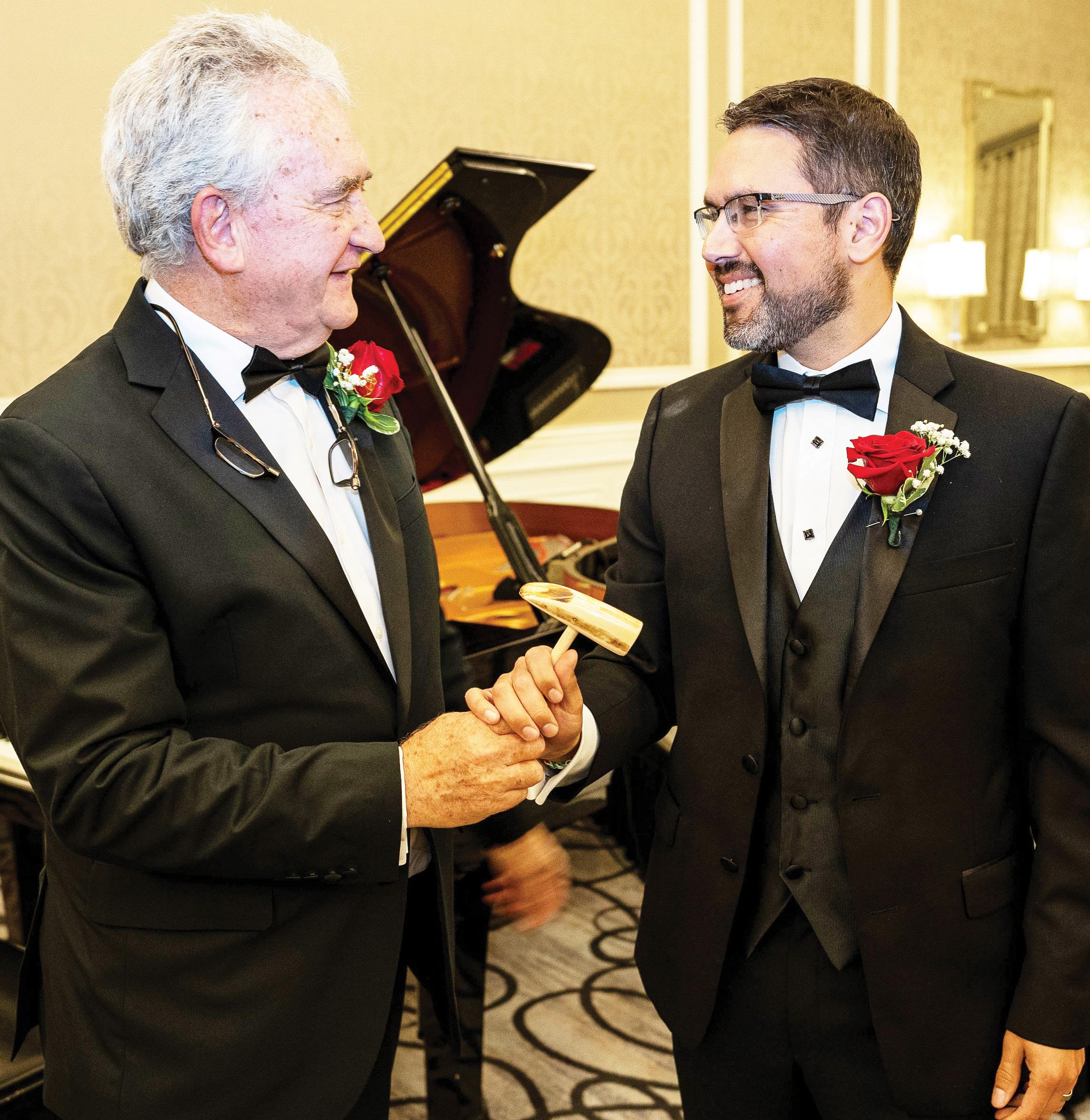
FALL 2023 A Recognized World Center for Advancing Health Care through Science, Education & Technology Plus... Past President Dr. Ricardo Morgenstern, 2022-2023, to Incoming President John M. Vasudevan, MD, CAQSM, FAAPMR, FCPP, 2023-2024 PCMS Installation and Awards Students Run PHILLY STYLE


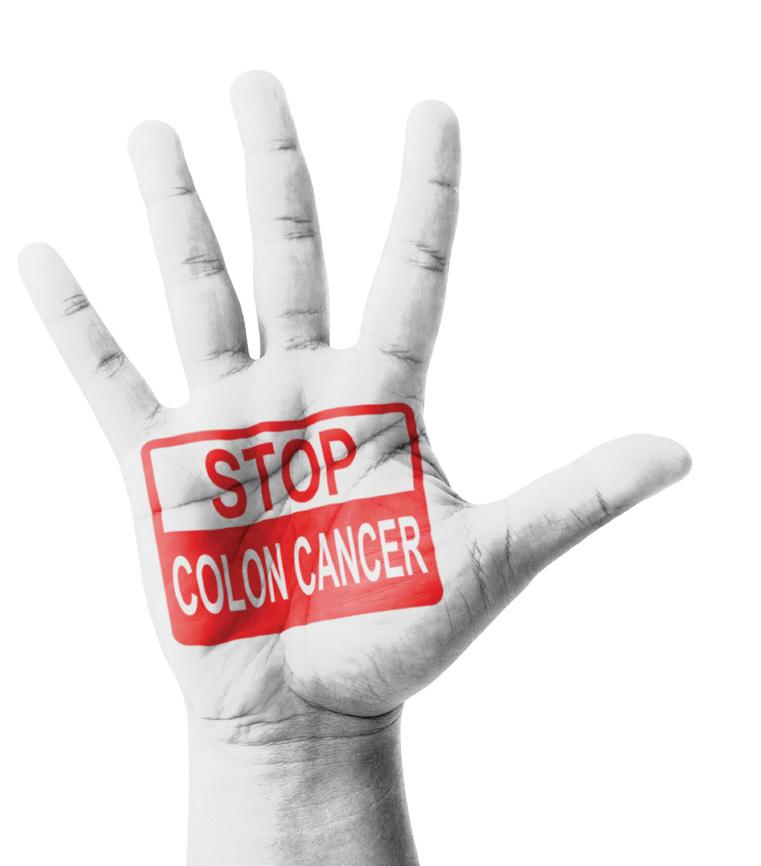
philamedsoc.org FOR ADVERTISING INFORMATION CONTACT: Tracy Hoffmann • Tracy @Hoffpubs.com • 610-685-0914 x201 The Official Magazine of the Philadelphia County Medical Society Locally-Written Health Care News That Impacts Your Community Your advertisement in Philadelphia Medicine will be read by more than 10,000 Philadelphia physicians, 25,000 affiliated health care practitioners, 1000 business, education and community leaders, and 100,000 engaged community residents throughout the Greater Philadelphia region. Read by More Than 100,000 Health-Conscious, Civic-Minded Philadelphians Advertise in Read online at pm.hoffmannpublishing.com SPRING 2022 A Recognized World Center for Advancing Health Care through Science, Education & Technology You can help end the HIV epidemic CLINICIANS: Riding theWaves of Burnout CRC SCREENING: GUIDING OUR PATIENTS THROUGH THE OPTIONS
Philadelphia County Medical Society
2100 Spring Garden Street, Philadelphia, PA 19130 (215) 563-5343

www.philamedsoc.org
EXECUTIVE COMMITTEE
John M.Vasudevan, MD PRESIDENT
Dale Mandel, MD
PRESIDENT ELECT
Ricardo Morgenstern, MD
IMMEDIATE PAST PRESIDENT
Oneida Arosarena, MD, FACS
SECRETARY
Dom Bucci, MD
TREASURER
BOARD OF DIRECTORS
Sharon Griswold, MD
Cadence A. Kim, MD, FACS
William King, MD
Elana McDonald, MD
Max E. Mercado, MD, FACS
Natalia Ortiz, MD, DFAPA, FACLP
Dhruvan Patel, MD
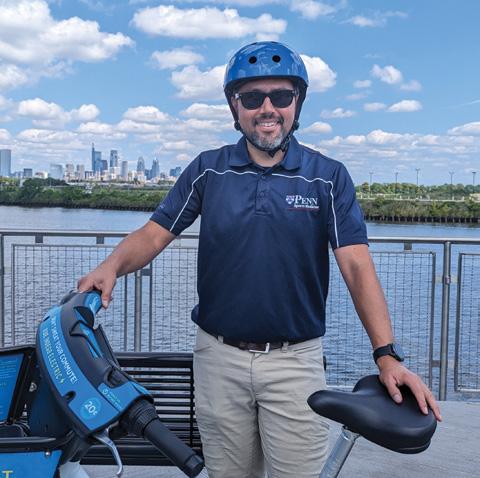
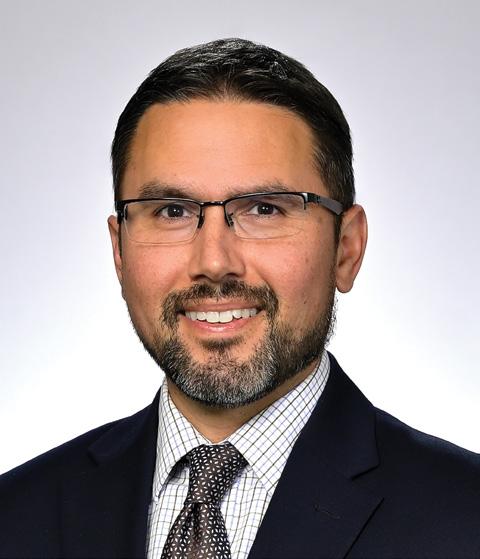
David A. Sass, MD, FACP
Katherine Sherif, MD
Walter Tsou, MD
Graeme Williams, MD
Rhea Trainson
FIRST DISTRICT TRUSTEE
John M.Vasudevan, MD
EXECUTIVE DIRECTOR
Mark C. Austerberry
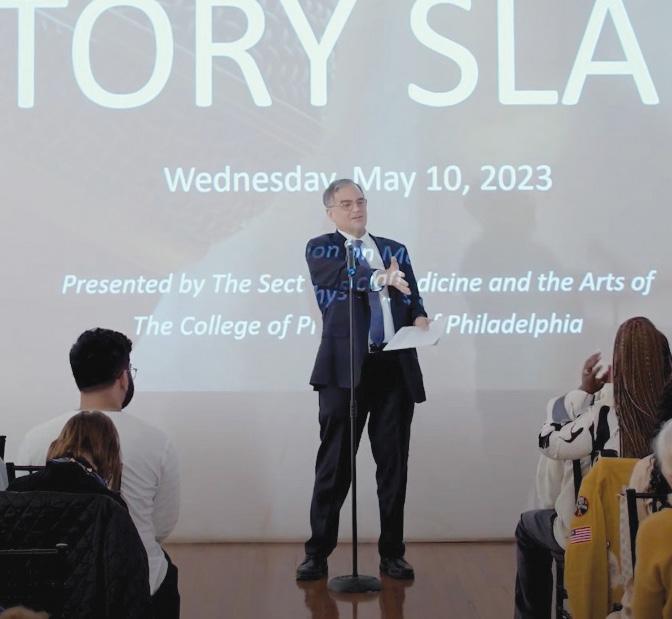
Editor
Tracy Hoffmann
Contents FALL 2023 Philadelphia Medicine is published by Hoffmann Publishing Group, Inc., Reading, PA HoffmannPublishing.com | (610) 685.0914 FOR ADVERTISING INFO CONTACT: Tracy Hoffmann • Tracy@Hoffpubs.com • 610-685-0914 x201
All rights reserved. No portion of this publication may be reproduced electronically or in print without the expressed written consent of the publisher or editor. 4 President’s Message 6 Meet John M. Vasudevan, MD, CAQSM, FAAPMR, FCPP 7 Congratulations PCMS Installation and Awards 14 Students Run Philly Style 18 Bike Share Philly! 20 Indego Bicycles 21 PMM Union Call for Responses 22 Constituent, Voter, Patience, Tenacity, Ask, Engage, Clinical 24 Welcome to America 26 Annual College of Physicians Story Slams 28 PCMS Student Interview: Heta Patel 30 Philadelphia Medical Society Day with the Phillies
The opinions expressed in this publication are for general information only and are not intended to provide specific legal, medical or other advice or recommendations for any individuals. The placement of editorial opinions and paid advertising does not imply endorsement by the Philadelphia County Medical Society.
President’s Message
John Vasudevan, MD PCMS
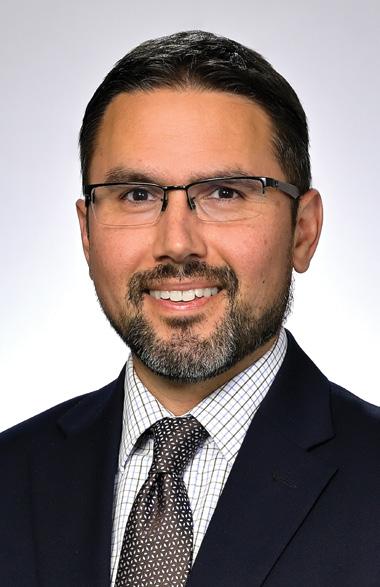
162nd President
Dr. John Vasudevan is an Associate Professor of Clinical Physical Medicine and Rehabilitation at the University of Pennsylvania and the Department of Veterans Affairs Medical Center in Philadelphia. He is a Team Physician for Penn Athletics; Head Team Physician for Archbishop Carroll High School in Radnor; Medical Director of the Broad Street Run and the Philadelphia Distance Run; and Director of the Running and Endurance Sports Program at Penn Medicine.
Installation Speech Excerpts
It is my pleasure to stand in front of you on this wonderful evening.
A couple years ago, I was having a rough day. I could go into extensive detail, but if you think about your practice…you know what I’m talking about. Running late, too many messages to juggle, too many complex patients, and then comes in this retired civil engineer. He told me one wonderful story after another about his career and all he had done, paused, and then mused wistfully, “I just loved my job. Don’t you just love your job?” I replied with a resounding “Ehhhhhhh…” and then explained how so much of a modern physician’s work is complicated by matters having nothing to do with actually caring for people. Electronic medical records make us the highest-paid data entry force in the country. Hours spent on prior authorizations and peer-topeer calls test our sanity. We watch the costs of medical practice increase while third-party reimbursement decreases. Our local health care infrastructure has been hurt as hospitals close, and the ones that remain are losing revenue. Physicians, nurses, and others in our medical team are leaving health care as burnout flares up. Societal norms are experiencing a monumental shift as the COVID-19 pandemic has us questioning pretty much everything. Heck, even my 5-star rating system took a hit when a patient gave
all 1-stars because he wasn’t allowed to change the TV channel in the waiting room!
After my rant, the patient paused, and then clarified, “I’m not talking about the bulls#*t. Every job has bulls#*t, and you can’t avoid that. I’m asking if you love your job?” Just then, fireworks went off in my head; this lovely man made it crystal clear: we can reduce but never eliminate nonsense, and we should never let it distract us from our true passion. In all the ways I am sure we have helped others through their life’s journey, it is a true blessing of our profession that our patients unexpectedly guide us through ours.
For every frustration we experience at work, the antidote is right there in front of us: our patients. I’m not saying every patient is as pleasant and charming as all of us, but each one provides perspective on how painful it can be to suffer, and also how joyful it can be to recover.
For example, it was an Amish farmer whose painful hand kept him from milking cows who taught me how devastating it can feel when you can’t contribute to your community; a Venezuelan woman paralyzed on one side from a stroke who was happy just to hold her great-grandchild with her good arm who taught me that sometimes it’s not what you’ve lost, but what you still have that matters most; a runner who had lost over 100 pounds and whose injury almost kept him from completing his first Broad Street Run who taught me that a combination of steady persistence and impromptu, creative solutions can help us reach long-term goals; a retired Oxford professor who makes me baked goods like tea scones and lemon curd every time I help her through a flare of pain who taught me that small gestures go a long way; a globetrotting Veteran who joked that he “did a bit of everything because he wasn’t really good at anything” taught me that only by trying new things can we live a fuller life; and two quiet, unassuming old men who I discovered helped to revolutionize solar energy for satellites in the 1960s and opened up international relationships
4 Philadelphia Medicine : FALL 2023
philamedsoc.org FEATURE
with China in the 1970s taught me that you don’t have to be famous to accomplish something legendary.
Why did I spend all this time sharing this with you? Because I know that you have stories like this, too. Each of us who practice medicine meet people we otherwise would not, and participate in a great human endeavor. These stories remind us of the community we have, and the duty we have through this Society to connect to each other and protect what makes our profession so special.
Yes, there will always be – to quote my patient – some bulls#*t we must endure. But if we work together, if we promote our successes and analyze our failures, if we advocate to our politicians and patients alike, if we stay focused not on wins or losses but on a common mission…the Philadelphia County Medical Society will continue to be the launching pad for the best of American medicine.
I believe that to be President of an organization as historic and venerable as this one is to strive for an important balance: to sustain the best traditions in medicine, to celebrate the work of our colleagues, and to seek new ways to make an impact in an ever-changing world. In the year to come, our Society will do what it has always done: seek the input of its members, from their first day of medical school and into retirement, so as to create and advance policies that define the highest aspirations for our patients and our profession. We will not only continue to recognize outstanding physicians with awards like those distributed
tonight, but serve as a platform for members to highlight their achievements with each other.
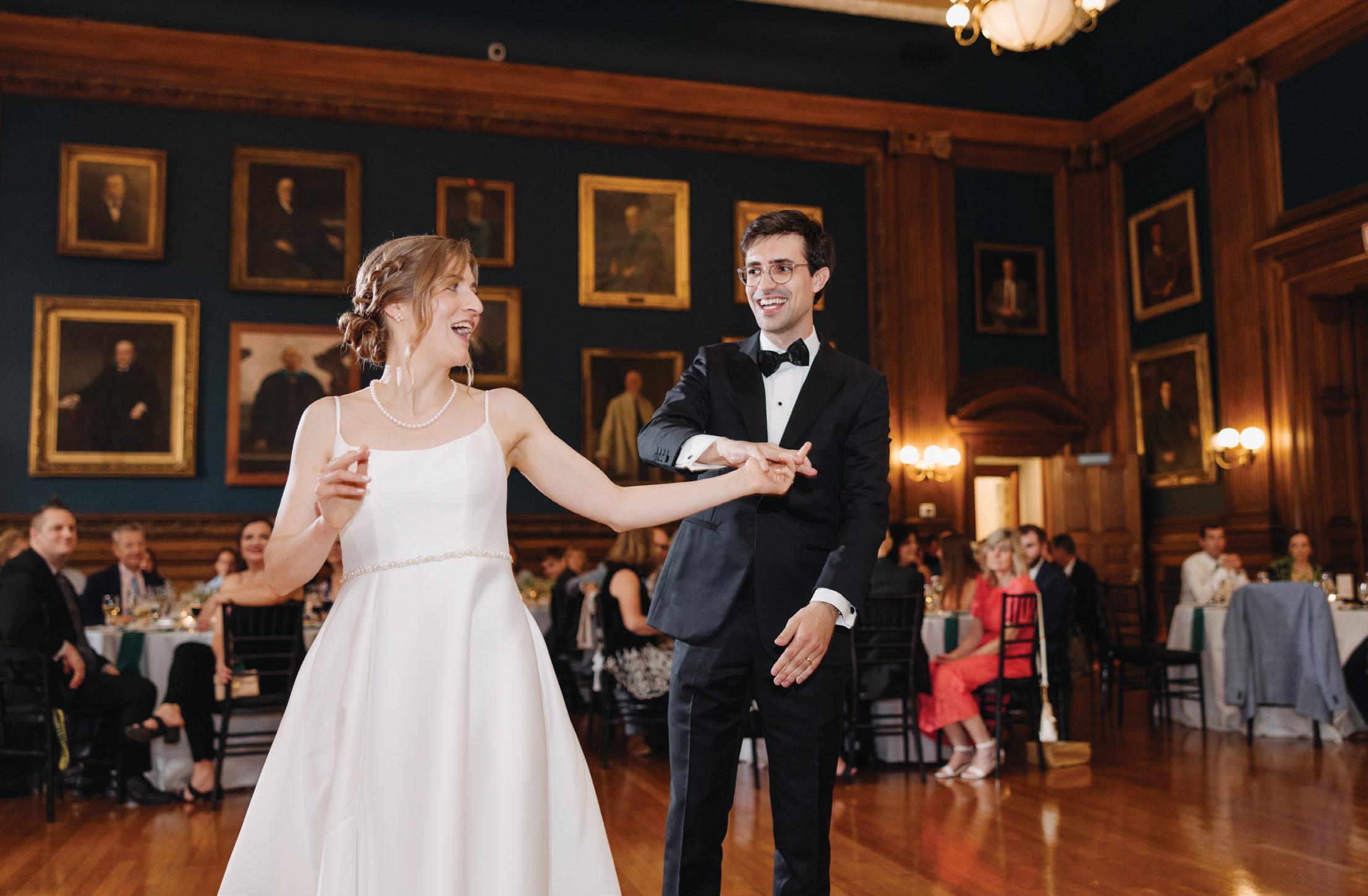
We will be contributing to the efforts with the College of Physicians of Philadelphia and Penn Medicine to grow the Hinkson Holloway Mentorship Program to recruit black men –the least-well-represented demographic among physicians – into our profession. I am working with the College of Physicians of Philadelphia to create what I call the “Doctor’s Lounge,” a series of casual gatherings where members can convene over food and drink and learn how to improve their business acumen without an MBA, their public health engagement without an MPH, their leadership potential without an MHA, and their political influence without running for office. All of this is done in the hope of increasing visibility and value of our Society throughout Philadelphia.

Of course, these are my initiatives, but what are yours? How can the Philadelphia County Medical Society help you? What can we do better? Please join me in my efforts, and let me know how I can maximize yours. As with any effective society, let’s share in the responsibility to tend to it and help it grow. I’m excited to see what we will accomplish together this year, and honored to be a part of it.
Now...let’s start sharing our stories, and then let’s get something done. Once again, thank you. •
philamedsoc.org 5 FALL 2023 : Philadelphia Medicine
Meet John M. Vasudevan, MD, CAQSM, FAAPMR, FCPP
162ND PRESIDENT OF THE PHILADELPHIA COUNTY MEDICAL SOCIETY

He seeks greater input from trainees and early career physicians who are crucial to define where organized medicine needs to go next. He plans to establish new programs in conjunction with the College of Physicians of Philadelphia, and new partnerships with local nonprofit organizations that foster the physical and educational development of students throughout the city.
and the Philadelphia Distance Run; and Director of the Running and Endurance Sports Program at Penn Medicine.
Dr. John was born and raised near Milwaukee, Wisconsin. He completed his Bachelor of Science and Doctorate of Medicine at the University of Wisconsin in Madison; Transitional Residency in Tucson, Arizona; and PM&R Residency at Thomas Jefferson University and Sports Medicine fellowship at Stanford University, before starting his career at the University of Pennsylvania.

Dr. Vasudevan has been an active member and leader in organized medicine since his first year of medical school. He has served on the Board of the Dane County Medical Society (Madison, WI); Wisconsin Medical Society; and Philadelphia and Pennsylvania Medical Societies, as well as involvement in the Pennsylvania Medical Society Political Action Committee. Dr. Vasudevan has also served on the Governing Council of the American Medical Association’s Medical Student Section and Resident and Fellow Section; Chaired the Innovation Committee of its Young Physician Section; and is a current Delegate to the AMA from the Pennsylvania Medical Society.
Dr. Vasudevan hopes to use his time in office to help our Society strengthen connections among members and increase engagement with the Philadelphia community. He respects the wisdom of experienced physicians to preserve the best traditions of medicine.
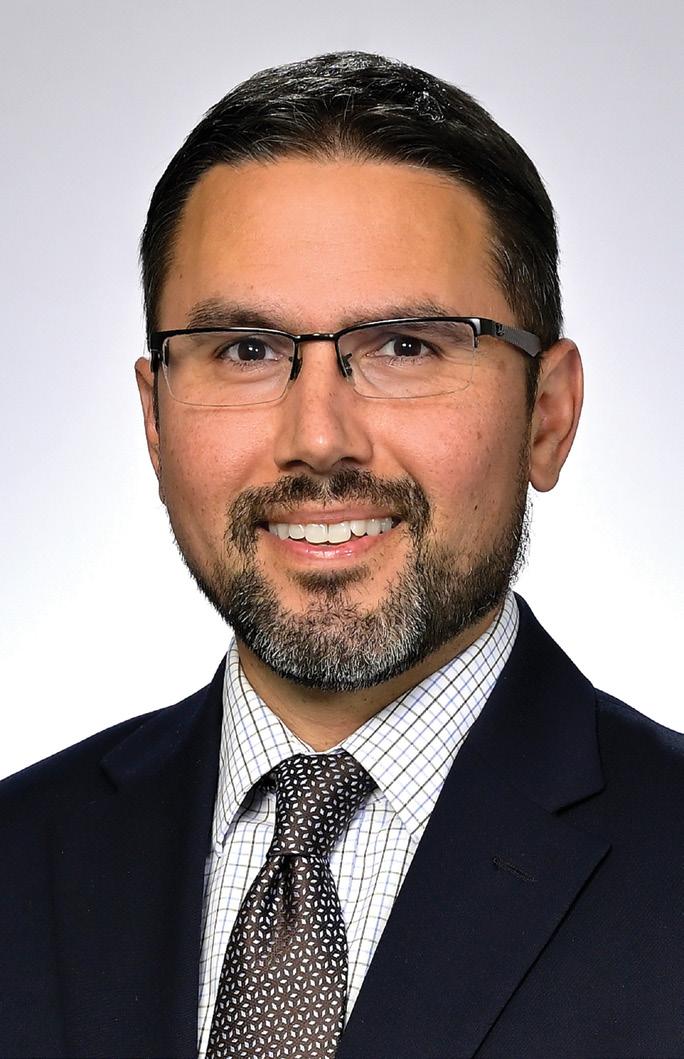

As much as he enjoys the practice of medicine, he often jokes that he is only working his job until he gets a record contract. He has been an avid drummer since childhood, from rock and jazz bands, to the University of Wisconsin Marching Band. He would be happy to tell stories about the Delaware Valley’s finest dive bars and clubs during his time with the Disgruntled Sherpa Project. He also enjoys skiing, hiking, and traveling as far and as often as he can.
Dr. Vasudevan acknowledges that nothing he has – or will – achieve, is accomplished without the support of family, friends, and colleagues. Whether you work with him every day, or are meeting him here tonight, he is grateful to be part of a Society that represents the best of our profession. He wishes to thank his mother Doreen for demonstrating the power of love and dedication; his father Sridhar for inspiring him to join the medical profession and engage with organized medicine to touch the lives of others; his brother Michael for his unwavering support and the kind of inside jokes only brothers can share; his daughters Molly and Jane for the boundless joy and laughter they bring him every day; and his wife, Kate, for her steadfast partnership, patience with his many busy pursuits, and proving just how lucky he is.
Congratulations and good luck Dr. Vasudevan! We look forward to a great year under your leadership as President of the Philadelphia County Medical Society. •
6 Philadelphia Medicine : FALL 2023
PCMS Installation and Awards
Cristol Award Recipient: Curtis T. Miyamoto, MD


The Cristol Award is presented to a physician member for their significant contributions to the Society furthering and enhancing the educational and charitable goals, purposes and functions of organized medicine. The award honors the memory of David S. Cristol, MD, an outstanding member of PCMS.
Curtis T. Miyamoto, MD, was the 152nd President of the Philadelphia County Medical Society. He has been a stalwart member of the Philadelphia County Medical Society (PCMS) and the Pennsylvania Medical Society (PAMED) since 2002 and a member of the AMA since 1991.
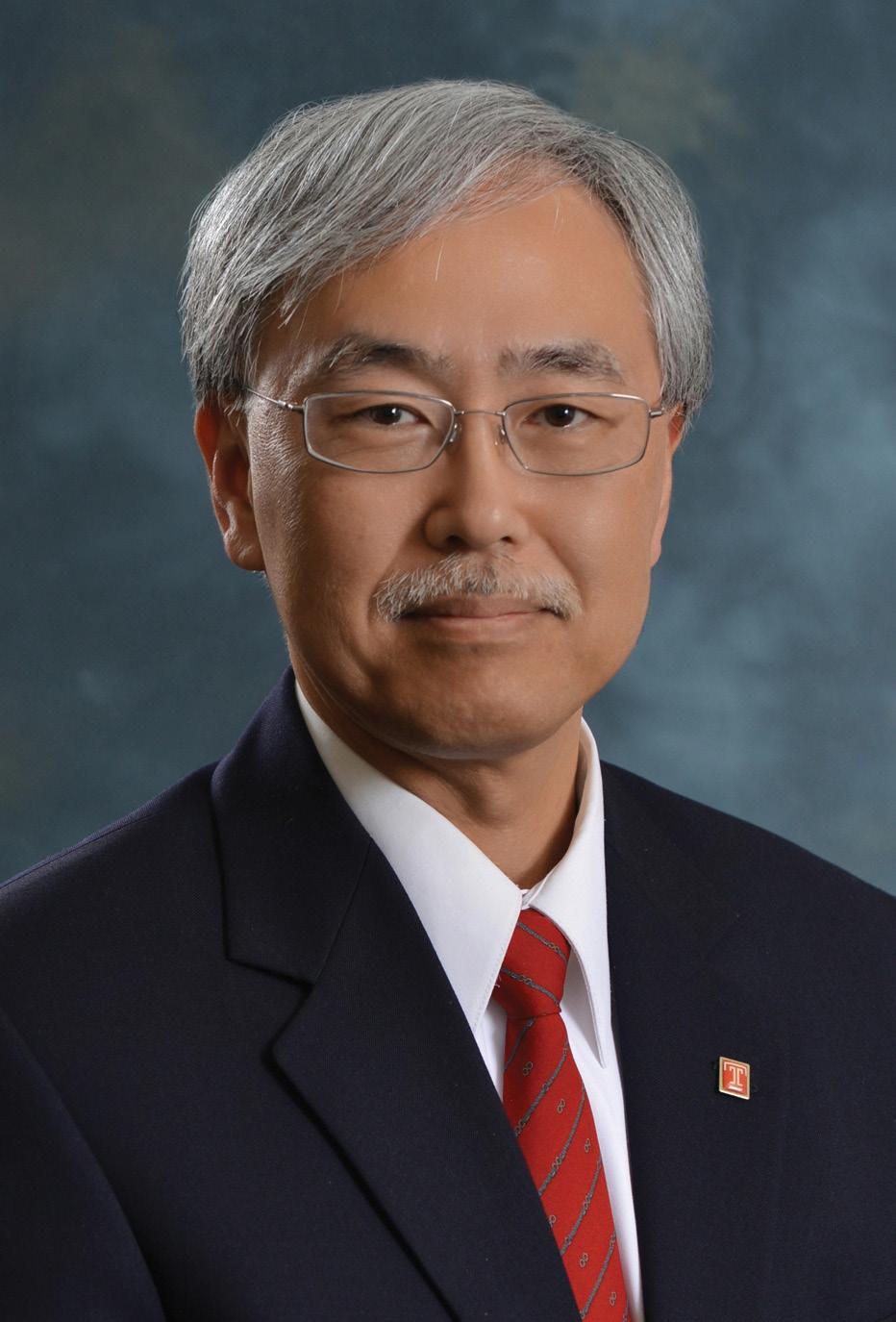
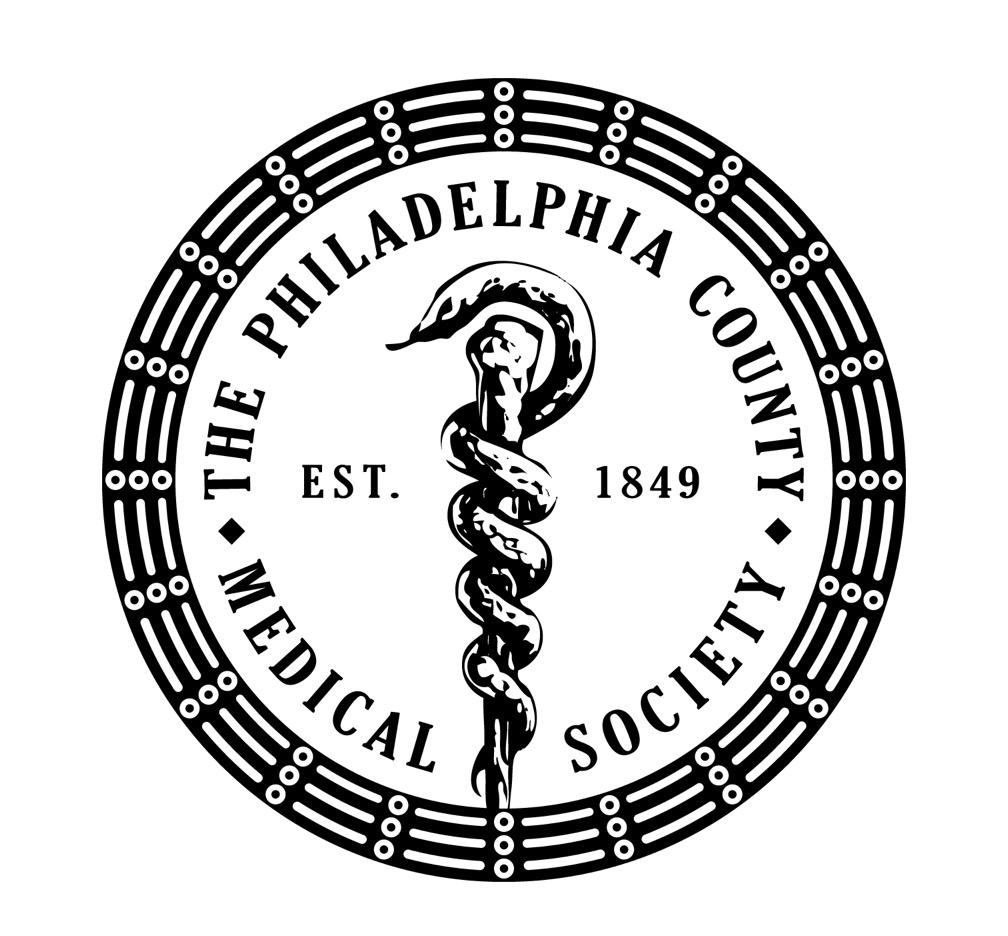
Dr. Miyamoto obtained his BS degree from Muhlenberg College and his MD degree from the Universidad de Navarra in Pamplona, Spain in 1986; a transitional internship at the Mercy Catholic Medical Centers; and a Radiation Oncology residency under the Chairpersonship of Luther W. Brady, MD, at Hahnemann University Hospital (Drexel University). After Dr. Miyamoto completed his residency, he became a Senior Instructor in the Department of Radiation Oncology at Hahnemann University where he went on to become Associate Professor and Vice Chair of the Department. Between January 2000 and January 2021, Dr. Miyamoto served as Professor and Chair of the Radiation Oncology Department at Temple University Hospital. He has also served as interim Chief of Medical Oncology and Interim Chairperson of Radiology at the Lewis Katz School of Medicine, Temple University. Dr. Miyamoto is currently Associate Director for Clinical Services at the Fox Chase Cancer Center at Temple University.
Dr. Miyamoto has served on the PCMS Board of Directors as past Treasurer; past President Elect; Delegate-at-Large; mentor for the PCMS Medical Student Section; and Delegate to the PAMED House of Delegates almost continuously, since 2005. Over the years he has served on multiple committees including Chair of the Bylaws Committee; Pfahler Foundation President; and member of the PCMS Nominating Committee.
Dr. Miyamoto is also active in numerous professional organizations and has been a member of the College of Physicians of Philadelphia since 1998; a dedicated
continued on next page
7 FALL 2023 : Philadelphia Medicine
Congratulations
philamedsoc.org FEATURE
FEATURE continued
Congratulations PCMS Installation and Awards
continued from page 7
member of the American Society for Radiation Oncology; Founding member of the Asociacion Ibero Lationamericana de Terapia Radiante Oncológica; Board member of the Society of Ibero-Latin American Medical Professionals; and currently serves on the Regional Board of the American Cancer Society.
For years Dr. Miyamoto has advocated for patients and professionals from Philadelphia City Council meetings to Pennsylvania Governors and members of Congress. Among his many honors, Dr. Miyamoto has been named one of Philadelphia’s “Top Docs” in Radiation Oncology by Philadelphia Magazine in their annual outstanding physicians’ issue for over a decade and is listed in Who’s Who in the World. The recipient of numerous awards, he is the recipient of the Physicians Recognition Award from the AMA; the American Cancer Society Volunteer and Volunteer Project Awards; and the Susan G. Komen Philadelphia, “Spirit of the Promise Award.”
Dr. Miyamoto is the author or co-author of over 50 peer-reviewed articles; a dozen book chapters and monographs; and 140 abstracts. Dr. Miyamoto speaks fluent Spanish; is an Eagle Scout; and a lifetime member of the Alpha Phi Omega fraternity.
Congratulations Dr. Miyamoto! We thank you for your lifetime of dedication, activism in organized medicine and outstanding medical service to our citizens and the medical professional community.
The purpose of this Award is to commend humaneness demonstrated by a Resident Physician member of PCMS. This humaneness is characterized by particular skills in working with people, patients and their families, and understanding human as well as clinical needs, especially in the kindness of treatment.

Lucy Cobbs, MD, is currently a 4th Year resident physician in ophthalmology at Wills Eye Hospital in Philadelphia. A graduate of Princeton University with honors in Ecology and Evolutionary Biology major, and Neuroscience certificate. During her time at Princeton, she volunteered over 700 hours as an EMT with the Princeton First Aid and Rescue Squad, serving the local area responding to medical emergencies. She also won a grant from the Princeton Neuroscience Institute to fund her research on evolutionary genetics of the sodium-potassium ATPase, and ultimately won the Charles M. Cannon Memorial prize for best senior thesis poster presentation within her major. In addition, she competed on the Princeton University sailing team as a skipper in double-handed high-performance boats, racing in regattas up and down the East Coast.
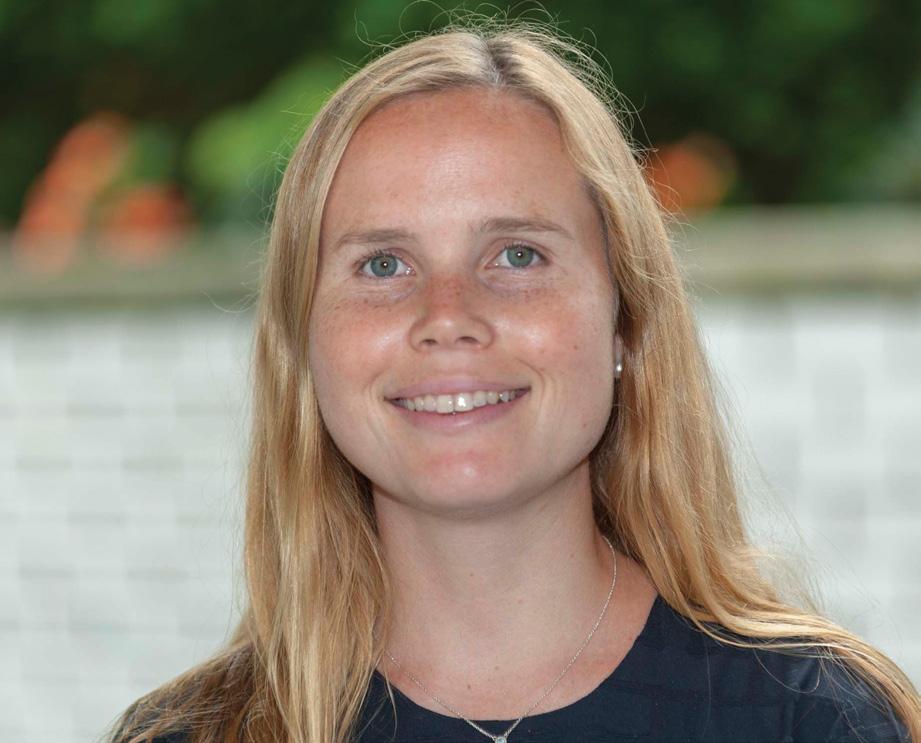
Dr. Cobbs then attended the New York University (NYU) Grossman School of Medicine, where she became interested in ophthalmology research, specifically using vision testing to diagnose concussions on the sidelines of kids’ sports events. She enjoyed volunteering in New York City, particularly with the running group “Back on My Feet,” and garnered recognition from NYU for completing over 100 hours of community service in her first three years of school. She was also selected as a member of the Alpha Omega Alpha honor society.
After graduating from NYU, Dr. Cobbs completed her internship at Memorial Sloan Kettering (MSK) Cancer Center, where she performed research on retinoblastoma and loved developing strong relationships with her patients and learning how to support them through difficult circumstances. Upon completion of her intern year, she was unofficially dubbed by her co-interns as the “class-empath” for her commitment to her patients and co-workers.
Vanitha Appadorai Vaidya, MD, Award for Humaneness in Medicine
Recipient: Lucy Cobbs, MD
The Vanitha Appadorai Vaidya, MD, Award for Humaneness in Medicine honors the memory of the devoted and loving wife of our past President, Shailendra Vaidya, MD.
She has loved being involved in medical education and was acknowledged by Jefferson medical students on the “Jefferson Educational Honor Roll” for excellent teaching. She also won a travel grant from the National Eye Institute to attend a conference for her research on the geographic distribution of visual impairment in the United States. On countless occasions it has been stated that Dr. Cobbs is a team player, and always has her co-residents’ and patients’ interests at heart.
In final, Dr. Cobbs also stands out for her thoughtfulness in providing humanistic thorough care for the most complex patients. She embodies the Wills motto, “Skill with Compassion,” states, Ophthalmologist-in-Chief, Julia A. Haller, MD.
8 Philadelphia Medicine : FALL 2023
philamedsoc.org
Dr. Lucy Cobbs is excited to pursue a two-year fellowship in vitreoretinal surgery at NYU starting this summer 2023.
Congratulations Dr. Cobbs! We thank you for your very special care and humanistic touch in medicine!
Hedrick leads the congenital diaphragmatic hernia (CDH) program at CHOP, recognized as the largest CDH program in the world. In 2004, Dr. Hedrick built the Pulmonary Hypoplasia Program (PHP), an interdisciplinary interprofessional team, to focus on the needs of children with surgical diagnoses that cause small lungs. The PHP unites neonatology, cardiology, pulmonology, psychology, audiology, gastroenterology, nutrition, and other fields as needed to give families comprehensive coordinated attention. Today, this program cares for more than 1,000 patients from birth through school age.
In 2018, Dr. Hedrick and team were named a CHOP Frontier Program for their focus on improving the lives of patients born with CDH. This prestigious award recognizes visionary programs that translate research to cutting edge clinical care, supporting aims to improve outcomes. The team’s focus on eliminating mortality and morbidity through research and the development of novel devices continues today with breakthroughs on the horizon.

Strittmatter Award Recipient: Holly L. Hedrick, MD, FACS
The annual Strittmatter Award is the highest honor presented to a physician who has made the most valuable contribution to the healing arts. Established in 1923 by I. P. Strittmatter, MD, the award commends the recipient’s contribution to one of the fundamental sciences of medicine, having a beneficial influence on either surgery or medicine.

Holly L. Hedrick, MD, FACS, earned her baccalaureate from Indiana University and her medical degree from Duke University, School of Medicine. She completed her general surgical residency at Brigham and Women’s Hospital and pediatric surgery residency at The Children’s Hospital of Philadelphia (CHOP) where she went on to become an attending surgeon in the Division of Pediatric General, Thoracic and Fetal Surgery.
Dr. Hedrick is the Director of the Pulmonary Hypoplasia Program; Surgical Director of the Extracorporeal Membrane Oxygenation (ECMO) Center, and Co-Director of the Neonatal Surgical Team. In addition, she is an investigator in the Center for Fetal Research and a Professor of Surgery in the Perelman School of Medicine at the University of Pennsylvania.
Dr. Hedrick specializes in fetal and neonatal surgery; surgical separation of conjoined twins; and the impact of innovative fetal and neonatal care from before birth through childhood and adolescence. Dr.
Dr. Hedrick has authored more than 200 peer-reviewed publications. She is a member of the Board of Directors for the Friedreich’s Ataxia Research Alliance since 2008 and was awarded the March of Dimes “Citizen of the Year” in 2006. In 2019 she was presented with the Joanne Decker, MD, Mentor Award at CHOP. This fall Dr. Hedrick will receive the Distinguished Alumni Award, the highest honor bestowed by the College of Arts and Sciences at Indiana University.
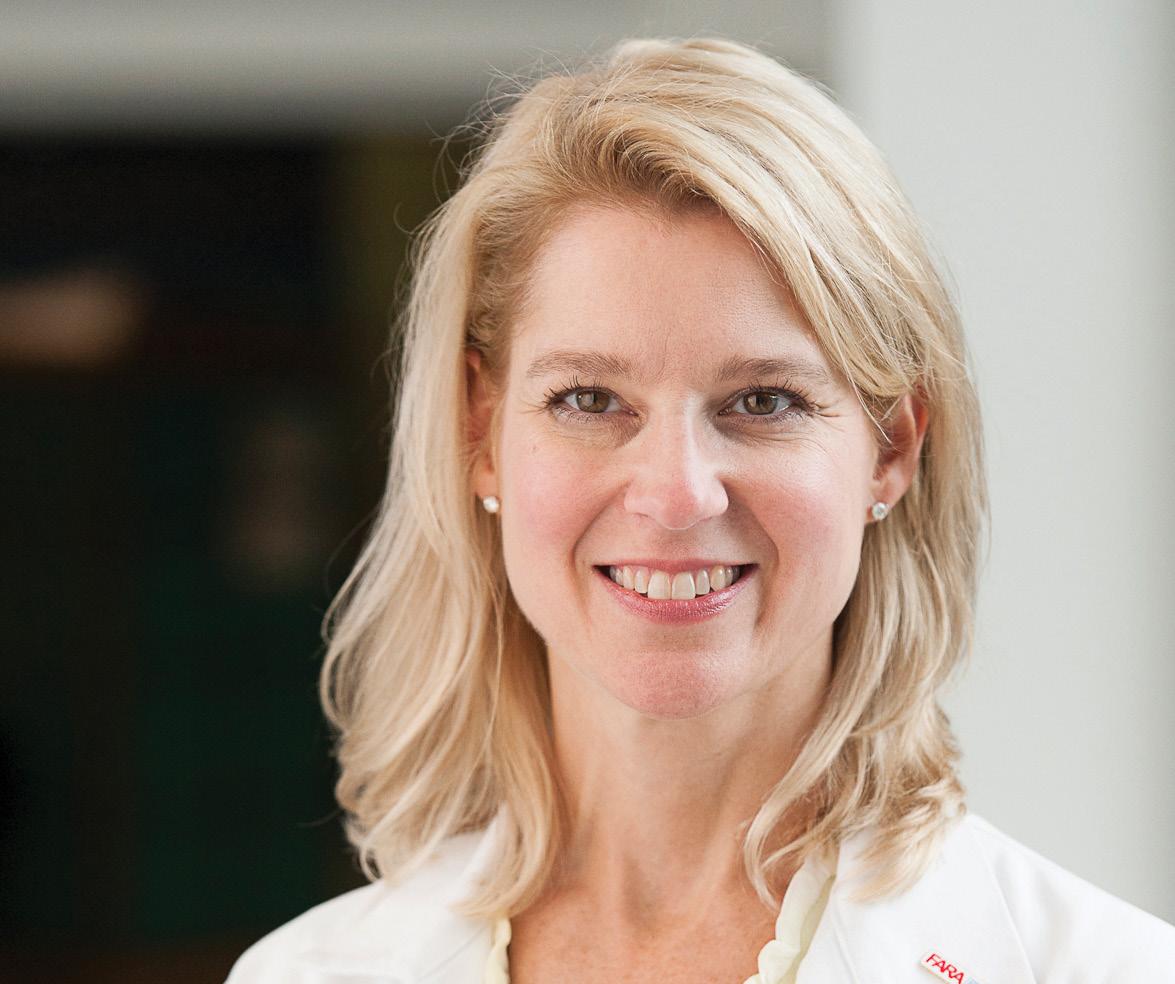
Dr. Hedrick finds a great sense of purpose when she sees her patients in the weeks, months, and years following a surgical intervention; knowing the trajectory of their lives has greatly been impacted.
Dr. Hedrick has three amazing children and enjoys spending time with her family between Pennsylvania and her hometown in Indiana.
philamedsoc.org
Congratulations PCMS Installation and Awards
continued from page 9
Practitioner of the Year Award
Recipients:

Elana McDonald, MD, FAAP, and Delana Wardlaw, MD, FAAFP, Twin Sister Docs Foundation
PCMS presents the annual Practitioner of the Year Award to a physician who has been nominated for dedication to the medical profession in the areas of quality patient care and community service. The award is supported by the Wiener Fund established by the late Jacob S. Wiener, MD, past member of PCMS.
Elana McDonald, MD, FAAP, is a board-certified pediatrician and her identical twin sister, Delana Wardlaw, MD, FAAFP, is a board-certified family medicine physician, from the Strawberry Mansion section of Philadelphia. They are both proud graduates of Central High School’s class of 1992.

Dr. McDonald graduated from Temple University’s Honor Program, magna cum laude, with a B.A. in Biology. She received her MD degree from the Pennsylvania State College of Medicine in Hershey, PA and completed a three-year pediatric residency at St. Christopher’s Hospital for Children in Philadelphia. She is a Fellow of the American Academy of Pediatrics, and a member of the Medical Society of Eastern Pennsylvania as well as a member of the Philadelphia and Pennsylvania Medical Societies.
Dr. McDonald has dedicated her career to providing compassionate, quality care to underserved populations from birth to 21 years. She is the owner and Chief Medical Officer of Memphis Street Pediatrics; Pizzica Pediatrics; and Castor Pediatrics in Philadelphia. For her commitment to service, she has been awarded the Pennsylvania
Medical Society’s Everyday Hero Award; WDAS Women of Excellence Award; Philadelphia City Council’s Living Legends Award and Women on the Move Award.
Dr. McDonald is one half of Twin Sister Docs. Together she and her sister Dr. Delana Wardlaw created Twin Sister Docs to promote healthcare advocacy in underserved populations.
The Twin Sister Docs mission is based on 3Ts: Trust, Translate, Transform. They are trusted messengers, providing accurate, culturally sensitive information that empowers people to take action to improve their health, leading to transformational outcomes.
Dr. McDonald’s twin sister, Dr. Delana Wardlaw, received her undergraduate degree from Temple University with magna cum laude honors and is a member of Phi Beta Kappa honor society. Dr. Wardlaw also received her medical degree from Pennsylvania State University College of Medicine and completed a Family Medicine residency at the former Montgomery Hospital in Norristown, PA where she served as chief resident.
Dr. Wardlaw has returned to her roots as she currently practices at Temple Physicians, Incorporated of Nicetown, in Philadelphia. Aware of the disparities in medicine, Drs. McDonald and Wardlaw have dedicated their careers to bridging such gaps in medicine. As a family medicine physician, Dr. Wardlaw cares for patients of all ages and often treats several generations of families. For her tremendous commitment, Dr. Wardlaw was awarded the 2020 Pennsylvania Family Physician of the Year Award. Dr. Wardlaw is highly active in the community and is dedicated to education, as she participates in health fairs, community events, radio talk shows and school activities. She also precepts medical students and residents from Temple University Health System. She serves on the health advisory board for ODUNDE, Incorporated to develop and implement community empowerment programs focused on health awareness.
Dr. Wardlaw is a board member of the Nicetown Community Development Corporation which implements programs that focus on equitable housing, social and economic development programs. As a member of the Medical Society of Eastern Pennsylvania, an organization of minority physicians, she focuses on addressing the medical needs specific to our communities as well as providing mentorship to aspiring and current minority medical students. Dr. Wardlaw also serves as a mentor to ODUNDE’s 365 program focusing on preteen and teen self-awareness, confidence and empowerment skills.
Dr. Wardlaw is a member of the Pennsylvania Academy of Family Physicians; the Philadelphia and Pennsylvania Medical Societies and the American Academy of Family Physicians. She is a diplomate of the American Board of Family Physicians and a fellow of the American Academy of Family Physicians. Dr. Wardlaw is the recipient of the WDAS Women of Excellence award for exemplary community service. She is also the recipient of Philadelphia City Council’s Living Legends award for providing medical care in socially and economically challenged areas as well as the Women on the Move award. She is
10 Philadelphia Medicine : FALL 2023 philamedsoc.org
FEATURE continued
a member of the Links Incorporated, an organization that focuses on health and human services, arts, mental health and services to youth.
The loss of their maternal grandmother to breast cancer at the age of 53 due to lack of access to quality medical care and mistrust of the medical establishment ignited their interest in medicine. They stated, “Our foundation allows us to extend our commitment to addressing health care disparities from our offices to surrounding communities, and various regional and national platforms. African Americans carry the burden of many diseases including but not limited to higher rates of breast, colon and cervical cancer, hypertension, diabetes, HIV, maternal morbidity and mortality, and infant mortality. COVID-19 created another health care disparity as African Americans are disproportionately affected due to higher rates of chronic illness, lack of access to care and other social determinants of health. With the impact of COVID-19, we redirected our efforts to provide educational resources and organize COVID vaccination clinics to increase awareness and access. As African American women, we make up 2% of the US physician population and thus we are uniquely qualified to have a significant impact on improving the healthcare outcomes in minority communities.”
Doctors McDonald and Wardlaw also focus on mentorship to increase exposure to the medical field so they can have a direct impact on increasing diversity in medicine. The Twin Sister Docs participate in various career days, panel discussions, and pre-medical preparedness lectures, as exposure is key and each one must teach one.
Twin Sister Docs are the recipients of a variety of awards including resolutions and citations from the City of Philadelphia; Delta Sigma Theta Sorority Incorporated’s Community Torchbearer Award; City of Philadelphia Community Champions Award; Semi-finalist for Philadelphia Magazine’s Health Hero Award; The
We are proud to support Philadelphia County Medical Society by advising them for more than a decade.
Nash Wealth Management Group
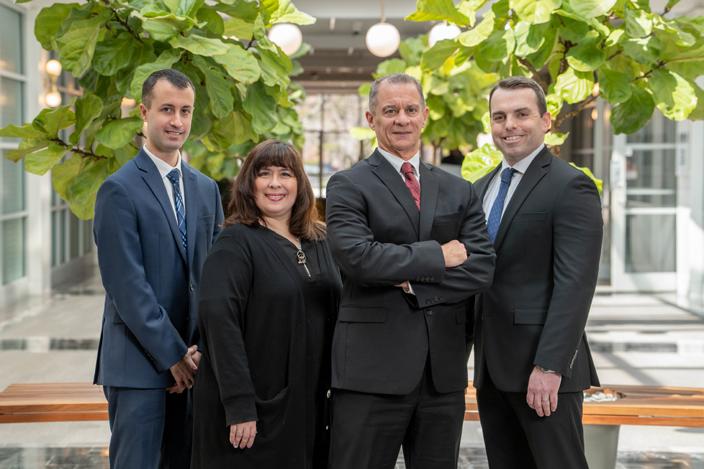
Merrill Lynch Wealth Management 1200 Howard Blvd. Suite 300 Mount Laurel, NJ 08054 856.231.5575
Merrill Lynch, Pierce, Fenner & Smith Incorporated (also referred to as “MLPF&S” or “Merrill”) makes available certain investment products sponsored, managed, distributed or provided by companies that are affiliates of Bank of America Corporation (“BofA Corp.”). MLPF&S is a registered broker-dealer, registered investment adviser, Member SIPC and a wholly owned subsidiary of BofA Corp.
Investment products:
Are Not FDIC Insured Are Not Bank Guaranteed May Lose Value © 2023 Bank of America Corporation. All rights reserved. | MAP5448947 Vault-BA1KP6 | MLWM-243-AD
470945PM-0323 | 03/2023
Alliance of Community Service Providers Excellence in Promoting Healthcare and Wellness Award; and the Links Incorporated Phenomenal Women Civic Award for Women Changing Lives. In addition, Twin Sister Docs have also been featured on Good Morning America; The Drew Barrymore Show; People Magazine; a Walgreens documentary and several other media segments.
Dr. McDonald is married and the proud mother of two sons. Dr. Wardlaw is also married and has a set of teenage twins.
PCMS is proud to honor and give recognition to Twin Sister Docs, Dr. Elana McDonald and Dr. Delana Wardlaw, who have demonstrated the highest art of medicine and outstanding contributions to the Philadelphia community. •
philamedsoc.org 11 FALL 2023 : Philadelphia Medicine
When you’re ready to make a difference, we’re ready to help
FEATURE continued
Congratulations PCMS Installation and Awards continued from page 11

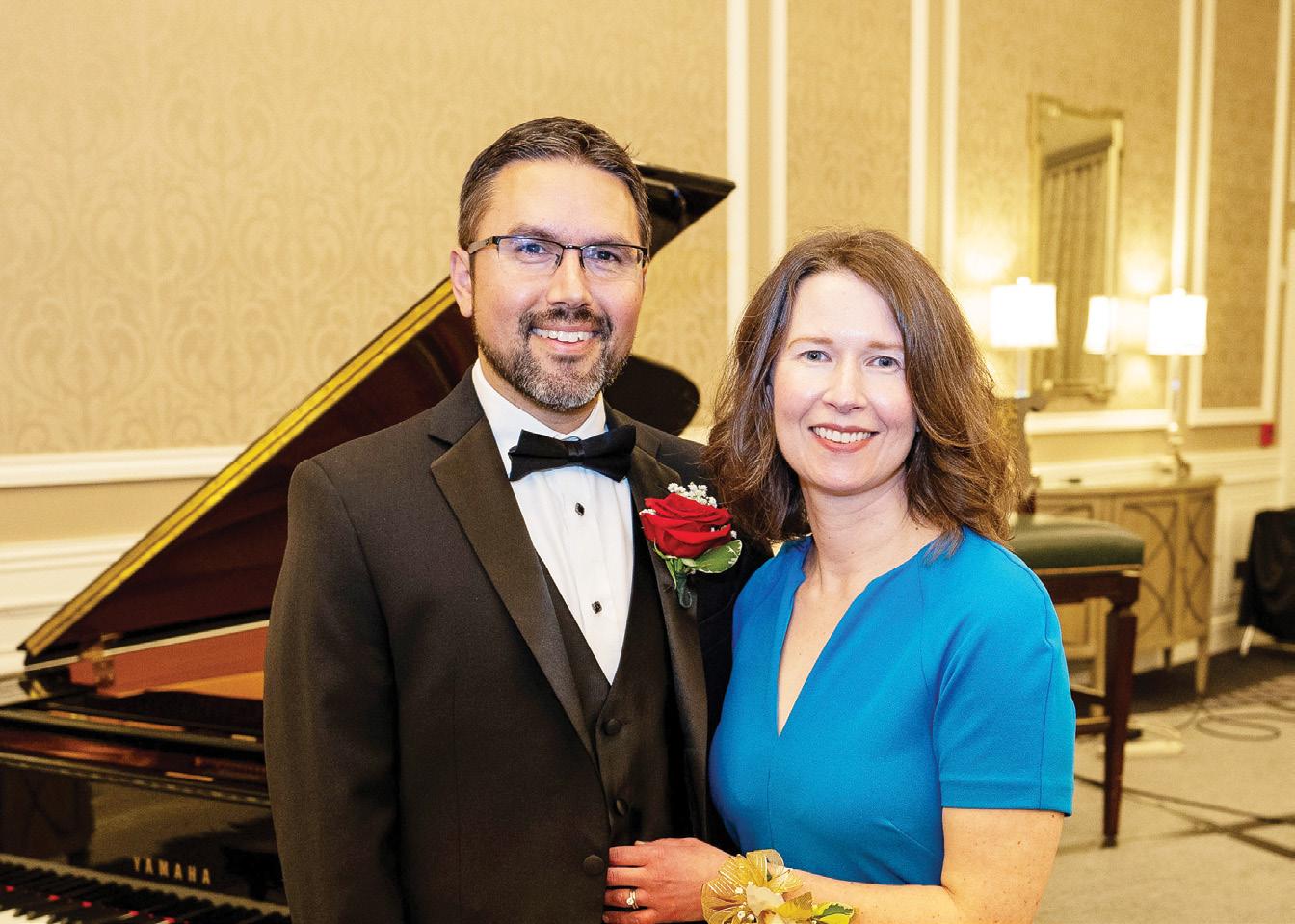

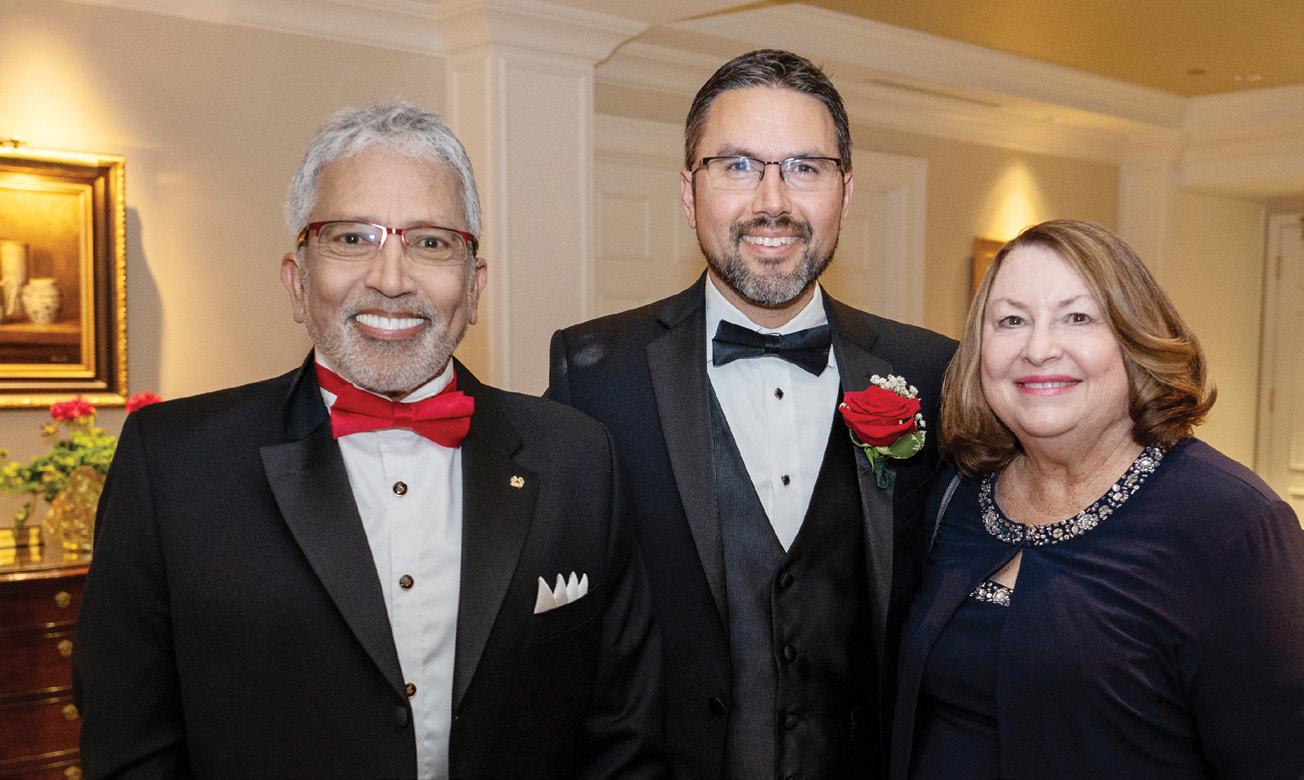
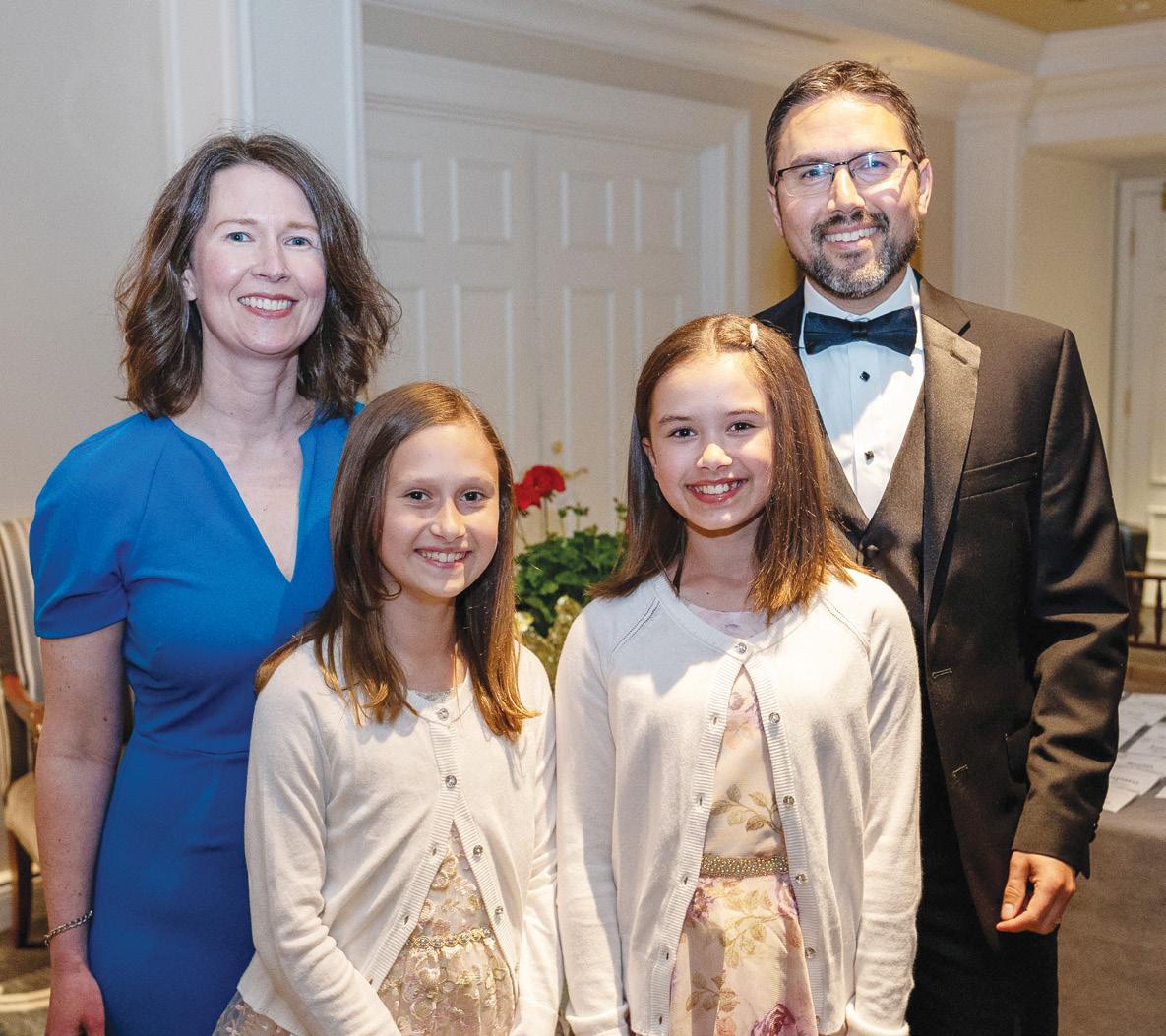
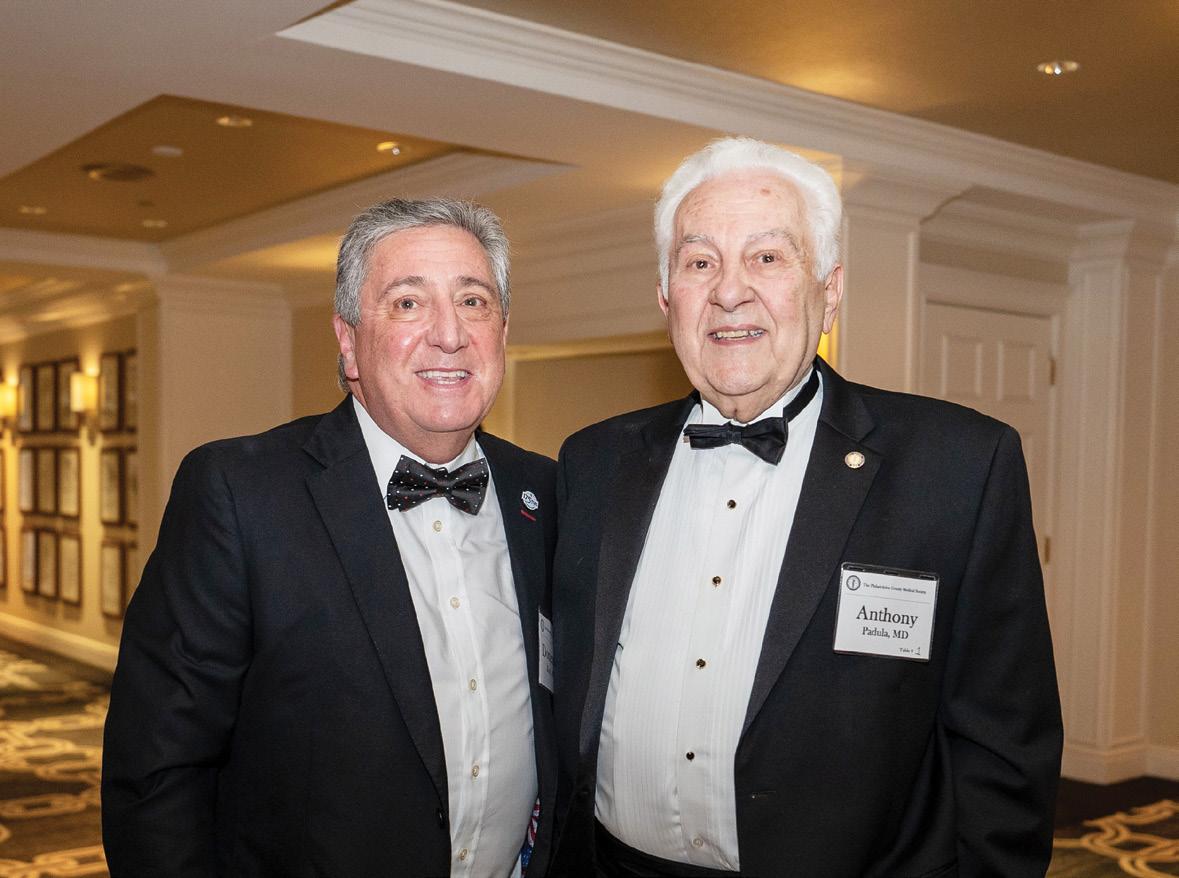
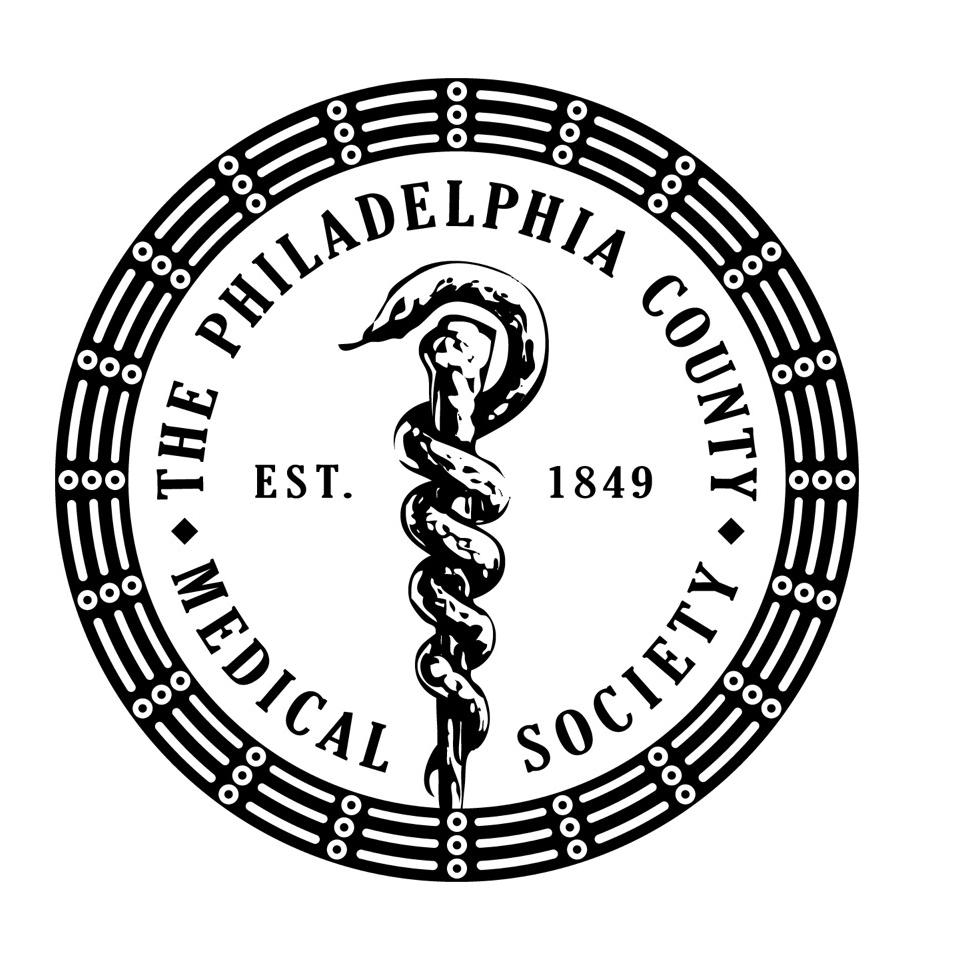

philamedsoc.org


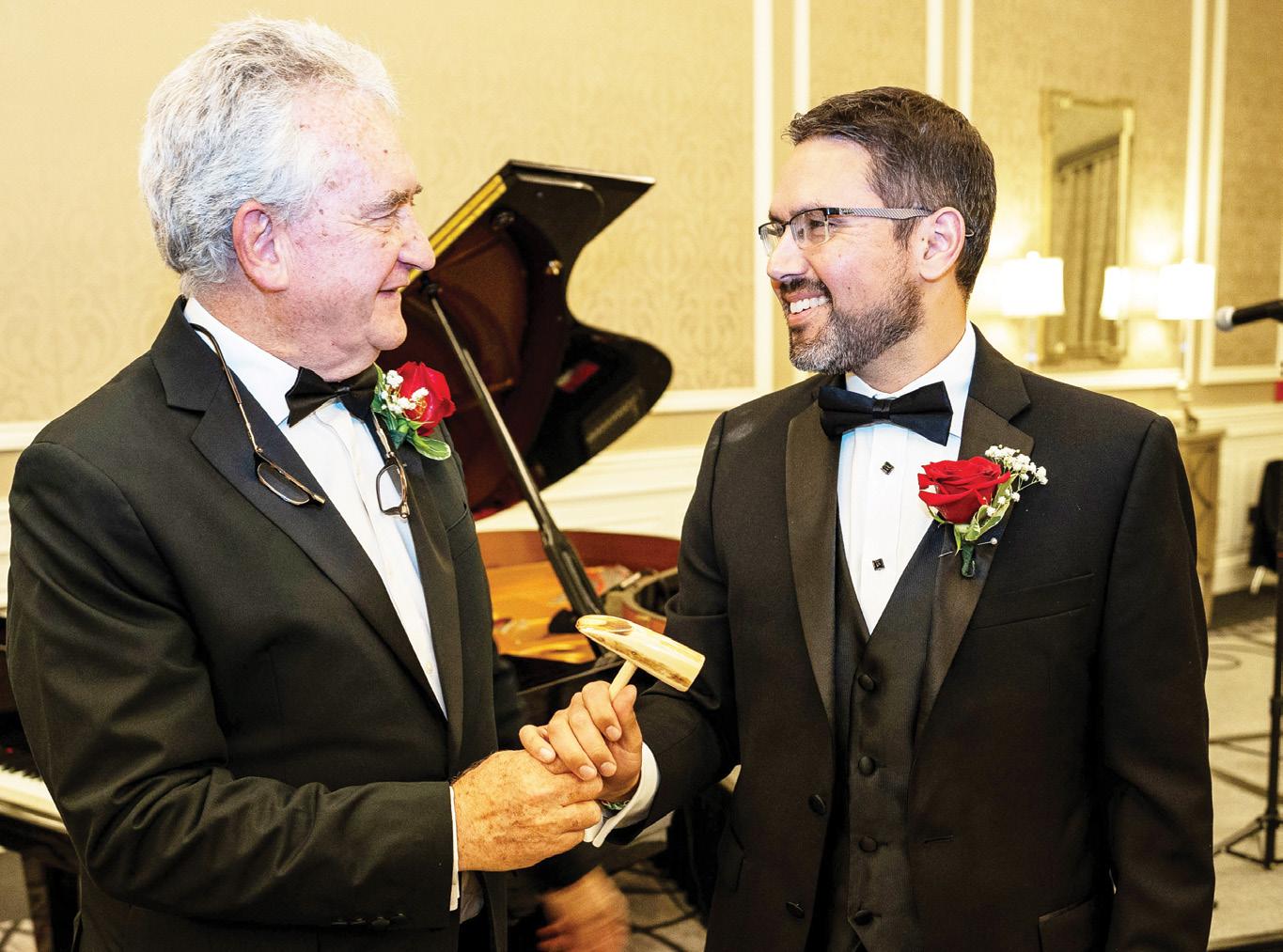
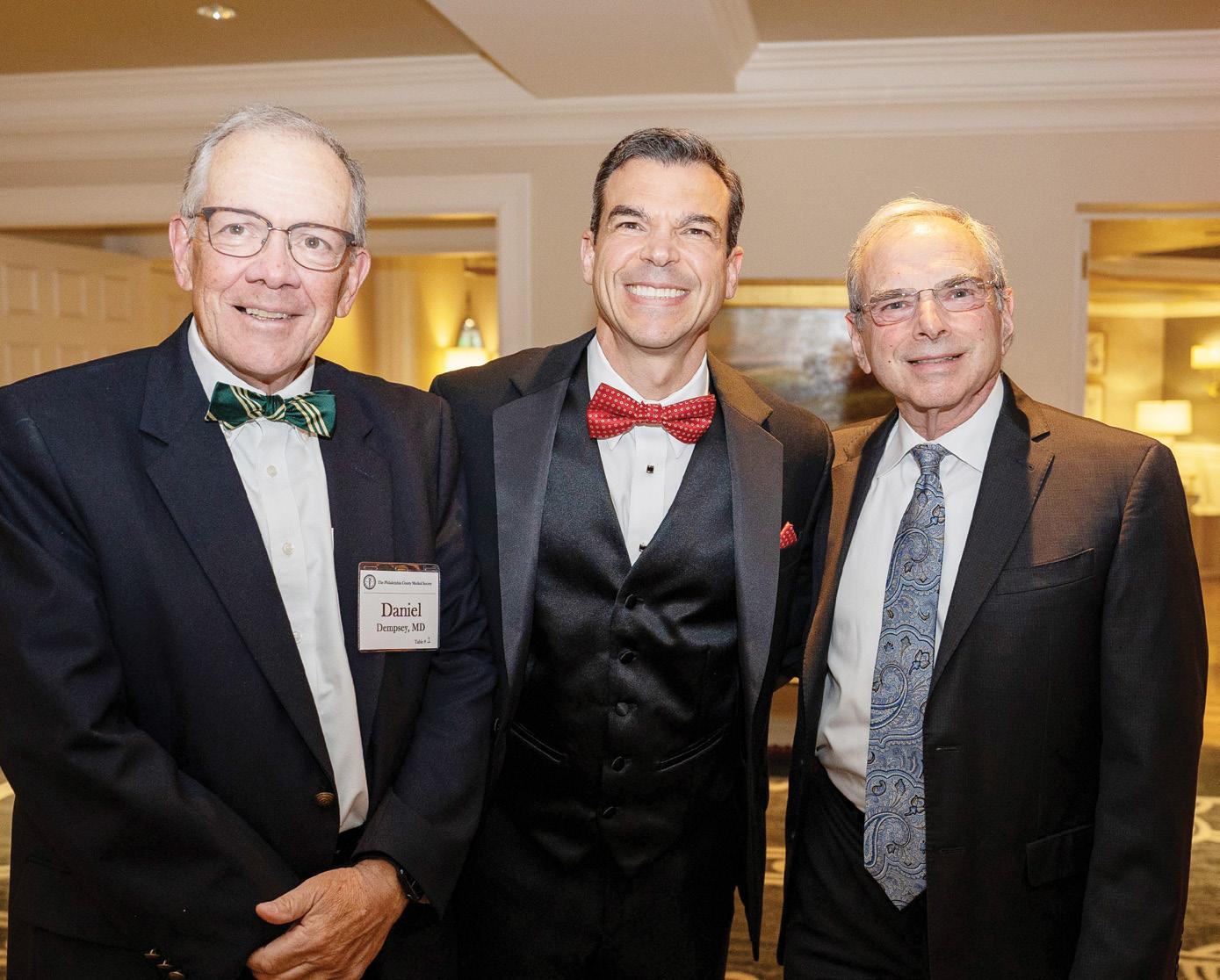

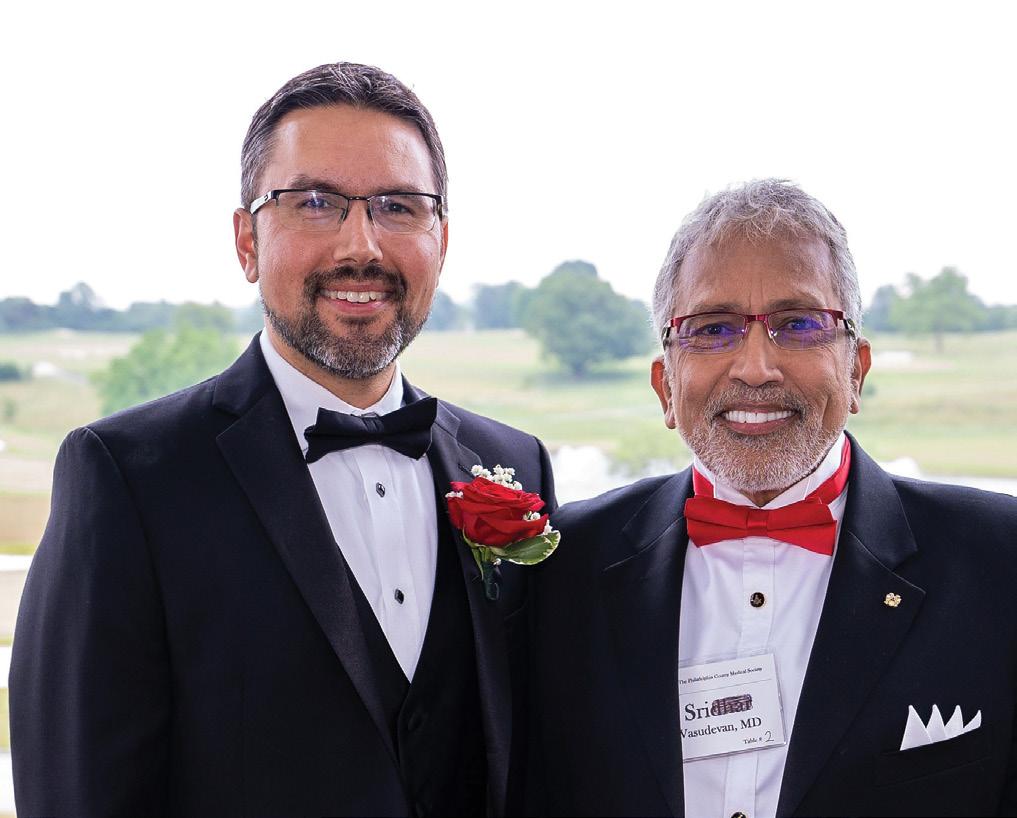
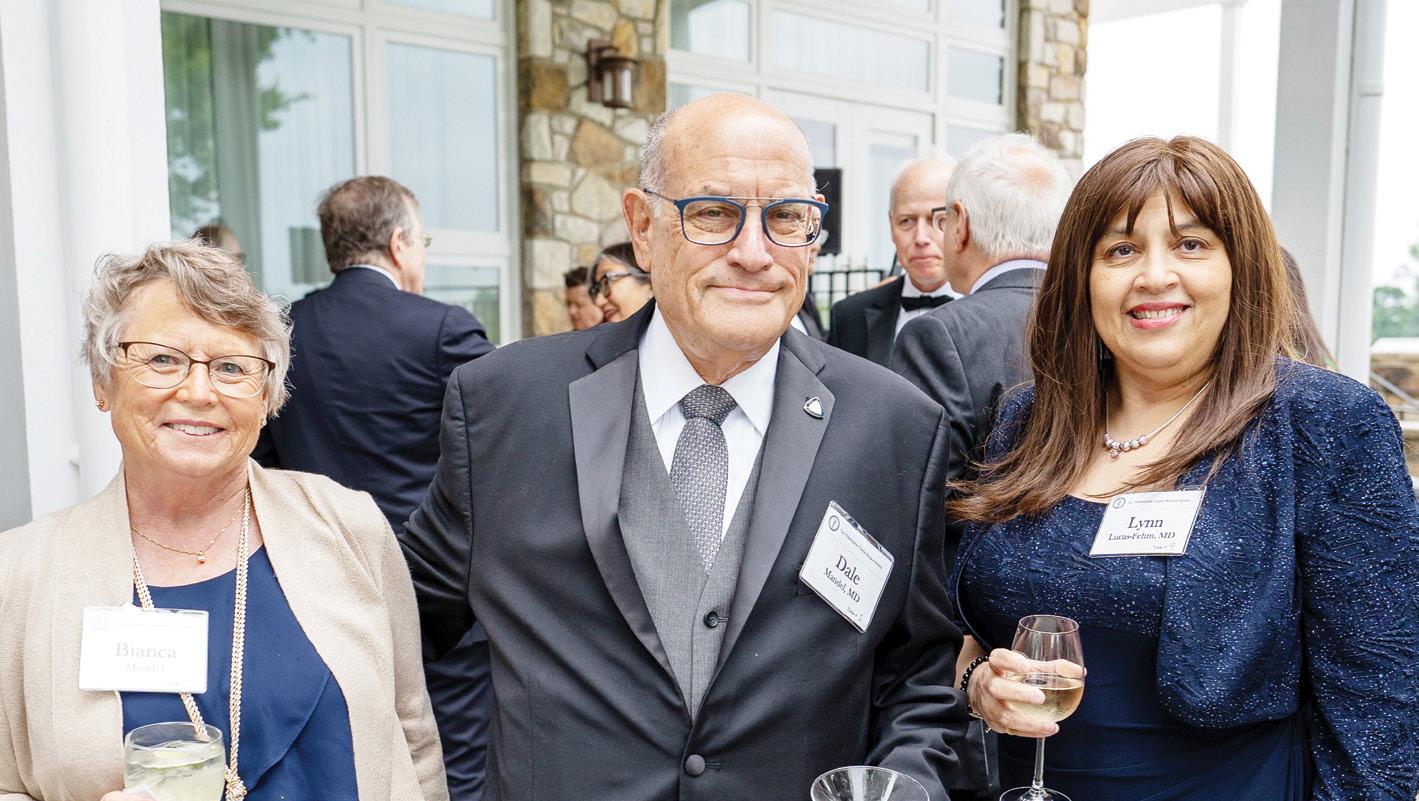
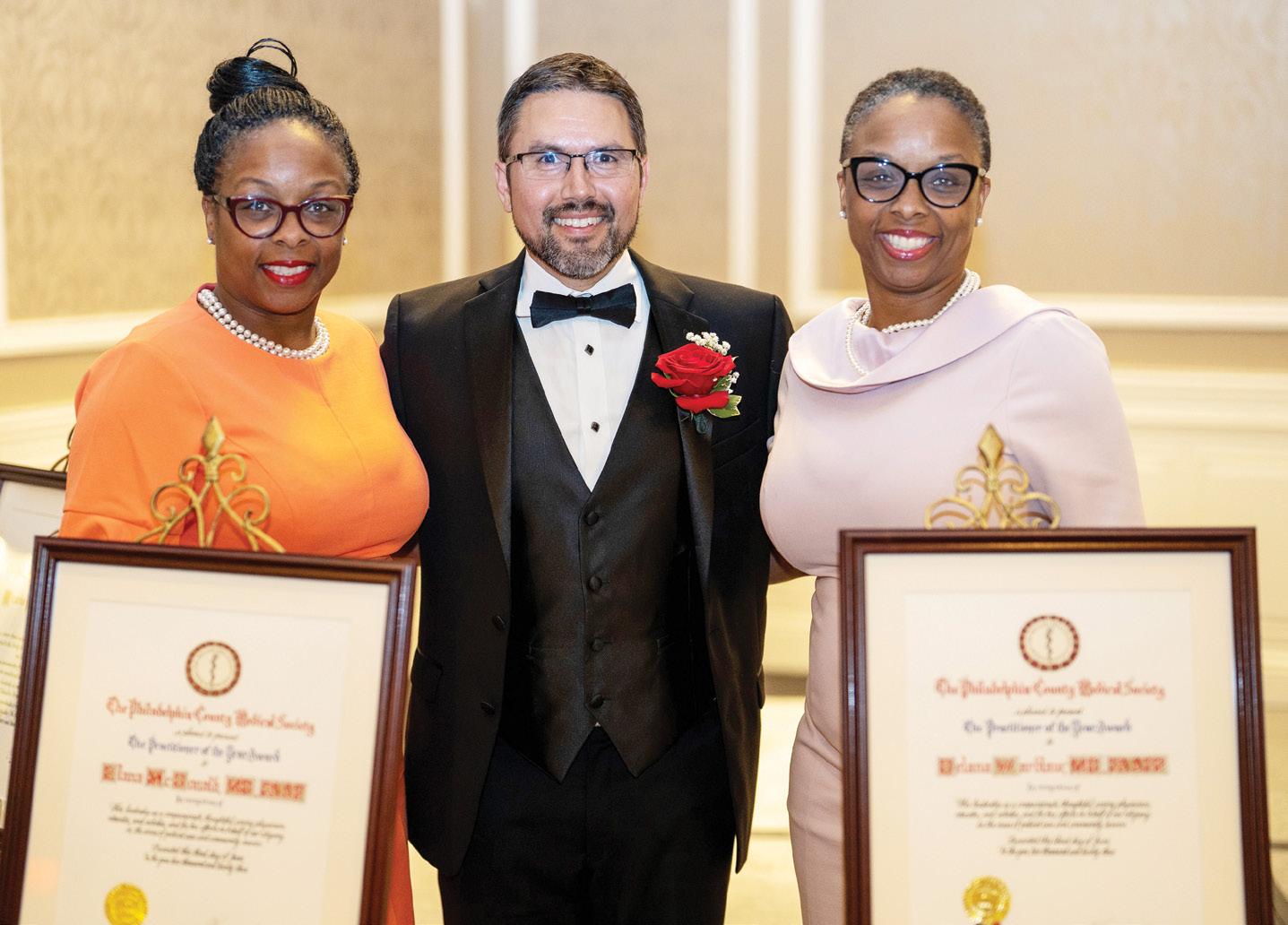
philamedsoc.org FALL 2023 : Philadelphia Medicine 13
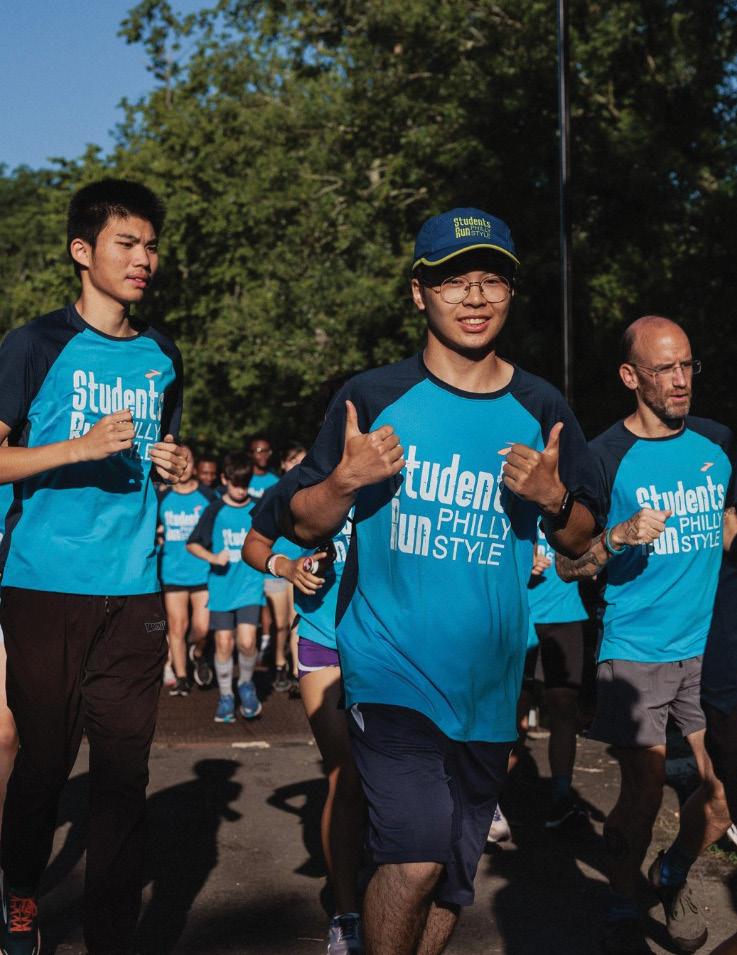
14 Philadelphia Medicine : FALL 2023 philamedsoc.org FEATURE
Students Run

PHILLY STYLE
By William King, MD, PCMS Boardmember
Our bodies are evolved to be in daily movement. From the time our ancient ancestors walked across the African savannas hunting and gathering, across the steppes, mountains, jungles and prairies of each continent…for millenia children and adults have likely asked each other one question. “Do we have to keep running?” Here in Philadelphia, in hundreds of doctors offices, rehabilitation centers, and consultation rooms, our patients ask us for the best way to restore or maintain their health. Our answer is often: get moving! The power of physical activity to maintain health and extend life is one of the few undisputed facts of medicine. With all of our pharmaceuticals, surgical techniques, and high tech computer analysis, doctors are faced with our inevitable challenge, the power to persuade our patients to get moving.
Dr. John Vasudevan, our incoming PCMS president, is faced with this challenge every day as a physiatrist, focused on physical medicine and rehabilitation. As a medical society, our task is to support our peers as they help their patients restore and maintain
their health. We know the powers of a balanced diet, good night’s sleep, and attention to our mind and body under stress, but we often do not provide our patients the added impulse from a recommendation to a plan to move from a sedentary lifestyle to a physically active routine. Philadelphia is blessed with the largest metropolitan park in the United States, beautiful riverfront trails, and a sports fanatical population of amateur teams to join, and yet Philadelphia has been ranked as the second most obese city.1 Our City of Brotherly Love loves to eat, but if we are going to eat, we are going to have to get moving as a city. Walking is a great start, but our ancient hunter ancestors would probably tell us that sometimes the solution is to get running.
At the Philadelphia Medical Society spring board meeting, we had the pleasure of meeting the executive director of Students Run Philly Style, Ms. Lauren Kobylarz. Many of our members struggle to find a way to get their patients engaged in personal physical activity early in life to help them develop lifelong healthy habits. Ms. Kobylarz explained that Students Run Philly Style (SRPS)
continued on next page
15 FALL 2023 : Philadelphia Medicine philamedsoc.org
1 Philadelphia Magazine “A Map of Obesity in Philadelphia,” Holly Otterbein, 9.16.2015
Students Run Philly Style
continued from page 15
started in 2004 with about 20 students, with the goal of preparing youth to complete a distance race. As SRPS approaches its 20th year, they serve 1000 students across Philadelphia. The program has been able to grow each year with their open-accepting teambased approach. They organize more than 50 teams across the city, with the support of 400 adult mentors. The teams are based out of recreation centers, parks, schools, and community groups across the city, and train on a 9-month calendar. Fall groups prepare for races in the late spring, and winter teams prepare for races the following fall. Lauren explains that “Every single year we start running, one block and then one single mile, so over time, we run one race each month. Our students practice three times a week, and they set a training goal towards a long distance race, first a 5K, 10k, 10-mile race, then eventually a half or a full marathon distance.” The students who participate are 6th through 12th grade, and Ms. Kobylarz reminds us that “the students are usually recruited in their neighborhood. Running is an activity that you can do where you live, so most of our students are getting the chance to navigate their neighborhoods safely with the adults in their lives and with our volunteer mentors.”
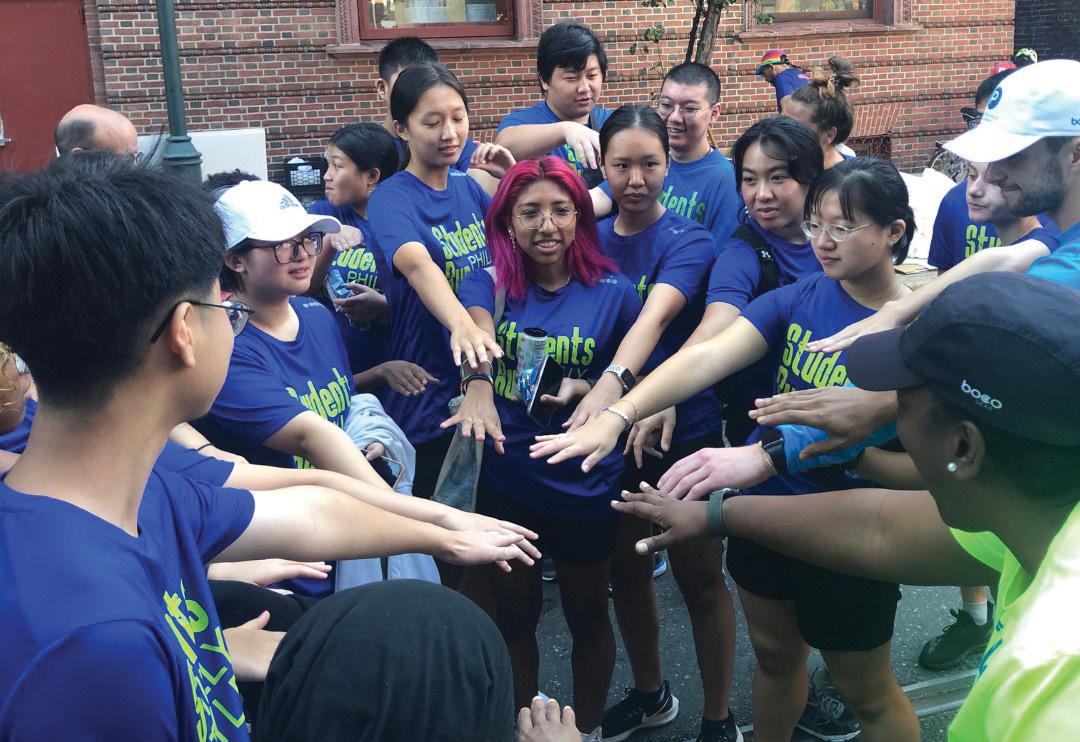
Students Run Philly Style has a 20-year track record (punintended), and the Philadelphia County Medical Society is looking forward to collaborating with them in their efforts in the coming year. Our first opportunity to collaborate centered around their premiere event, the Philadelphia Distance Run. The Distance Run, September 17th, 2023, provided opportunities for our physician and health care providers to run in the 5K or half marathon race, sponsor a running team, or support the first aid tent and hydration stations. Even easier, PCMS members also joined in supporting the Extra Mile Fundraiser that was held September 15th.
Lauren was thrilled to engage the physician community through PCMS, since “At Students Run, a lot of our students, as they’re entering their teenage years, are trying something like running that’s new to them, in an environment that is really welcoming and, feels safe to overcome the challenges that come with trying something new and working towards a goal.” When PCMS asked Ms. Kobylarz whether our members would be able to mentor students in running, she assured us that adult mentors join their running teams at every level of fitness and interest level. She explained, “The beauty of our program is that everyone
FEATURE continued philamedsoc.org
16 Philadelphia Medicine : FALL 2023
is learning together. You do not need to have any running experience to join our program as a mentor or a student. We provide all the support to teach you about running, teach you about how to stay healthy while you’re running, and while you’re not running we provide a training plan. We provide free running sneakers, equipment, transportation, and race registration to our students. We will get you to the finish line if you can make the time commitment. We hope that our leaders and our mentors are learning alongside our students; that creates a genuine mentoring relationship because you are experiencing something for the first time together.”

Our incoming president agrees. Dr. Vasudevan states, “As a sports medicine physician with an interest in running and endurance athletes, I know how important it is to establish a pattern of fitness to improve quality of life and a sense of well-being. Students Run Philly Style embodies this idea and helps to inspire young people in every zip code of our city to embrace a healthy lifestyle. The partnership between PCMS and SRPS allows each organization to amplify our efforts to improve the health of Philadelphians.” So, doctors, let’s run to support this collaboration. We can research our collaboration at www.studentsrunphilly.org. •
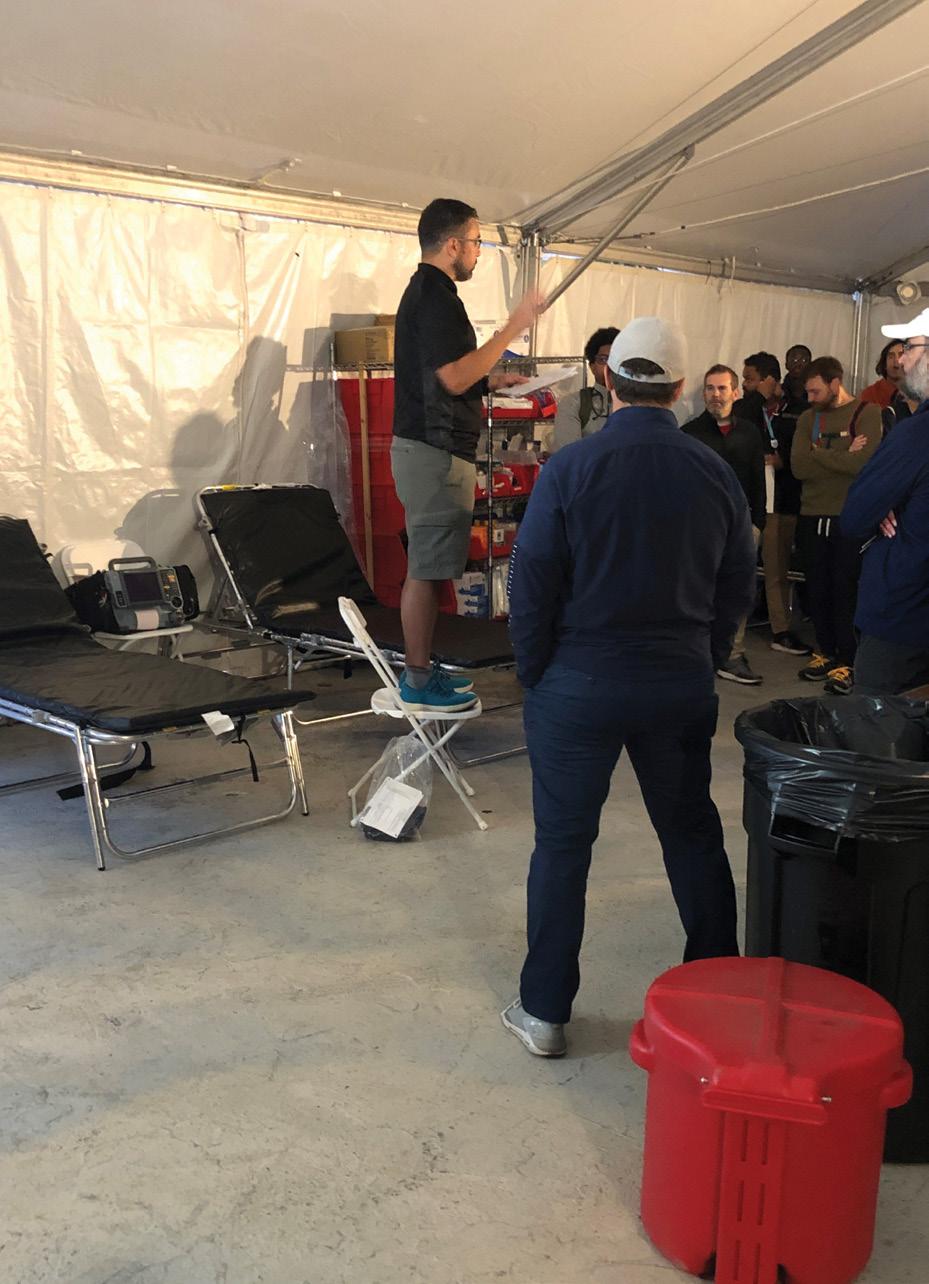
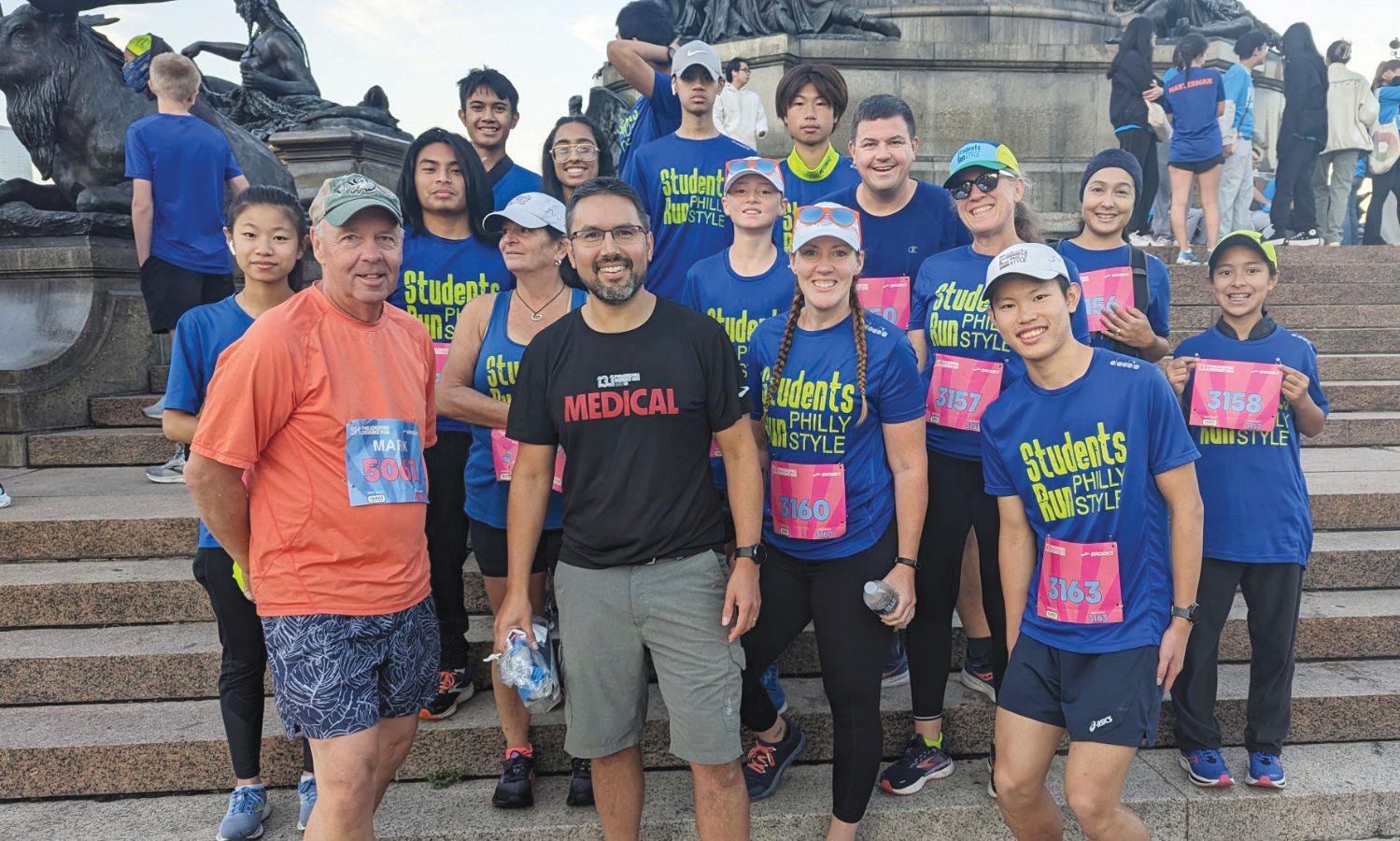
philamedsoc.org 17 FALL 2023 : Philadelphia Medicine
Above: Mark Austerberry, PCMS Executive Director, & John Vasudevan, PCMS President, along with Students Run Philly Style following their 5K Run.
At left: John Vasudevan, PCMS President & Philly Distance Run Medical Director, providing last minute instruction to the volunteer medical staff.
Bike Share Philly!
Waffiyyah Murray with the City of Philadelphia – Office of Transportation, Infrastructure, and Sustainability. Waffiyyah is a current NABSA Board member and NABSA’s DEI Committee Chair.
Kicking off our first Workforce Diversity Wednesday is Waffiyyah Murray with the City of Philadelphia – Office of Transportation, Infrastructure, and Sustainability. Waffiyyah is a current NABSA Board member and NABSA’s DEI Committee Chair.

Learn about how she came to her role, her favorite things about her role, and what has surprised her most below:
How did you come to arrive at working in shared micromobility and your current role?
I started working in shared micromobility in 2015 when Indego first launched here in Philadelphia. I led bike safety and education programming for Indego, teaching people how to ride a bike and leading group rides throughout the community while at the Bicycle Coalition of Greater Philadelphia. I then transitioned over to the City of Philadelphia in 2017, first as the Indego Community Coordinator leading community engagement, then I managed the Better Bike Share Partnership, a national initiative focused on equity and access in shared micromobility before transitioning into my current position as Indego Program Manager where I oversee the bikeshare system for the city.
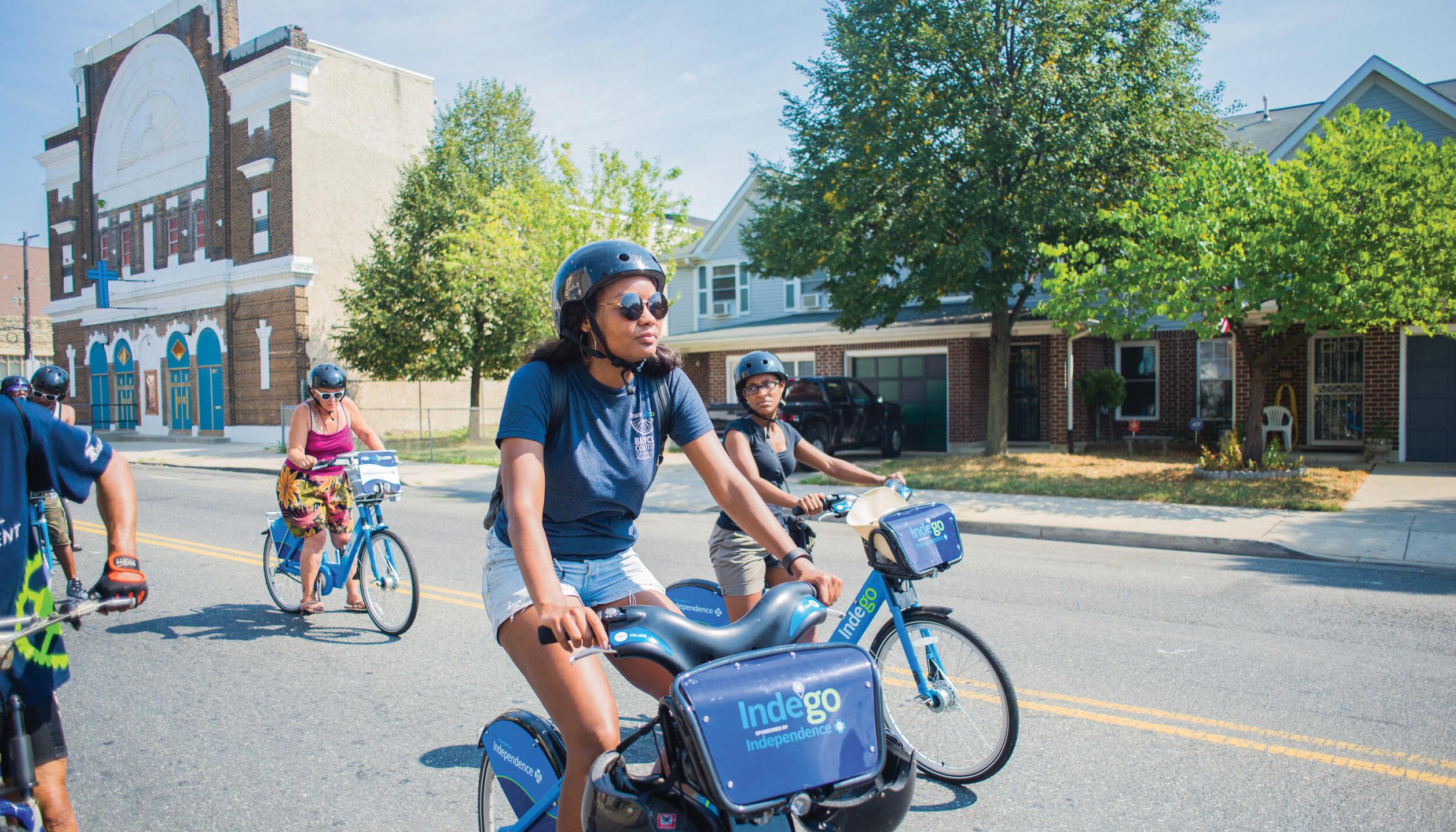
18 Philadelphia Medicine : FALL 2023
philamedsoc.org FEATURE
What is your favorite thing about your job?
I love when someone comes up to me and says they rode one of the Indego bikes the other day for the first time and enjoyed it, or they’re excited about the new station in their neighborhood. It really shows the growth and impact of the program. Shared micromobility can provide access and joy for so many people and I’m thankful to work in this field.
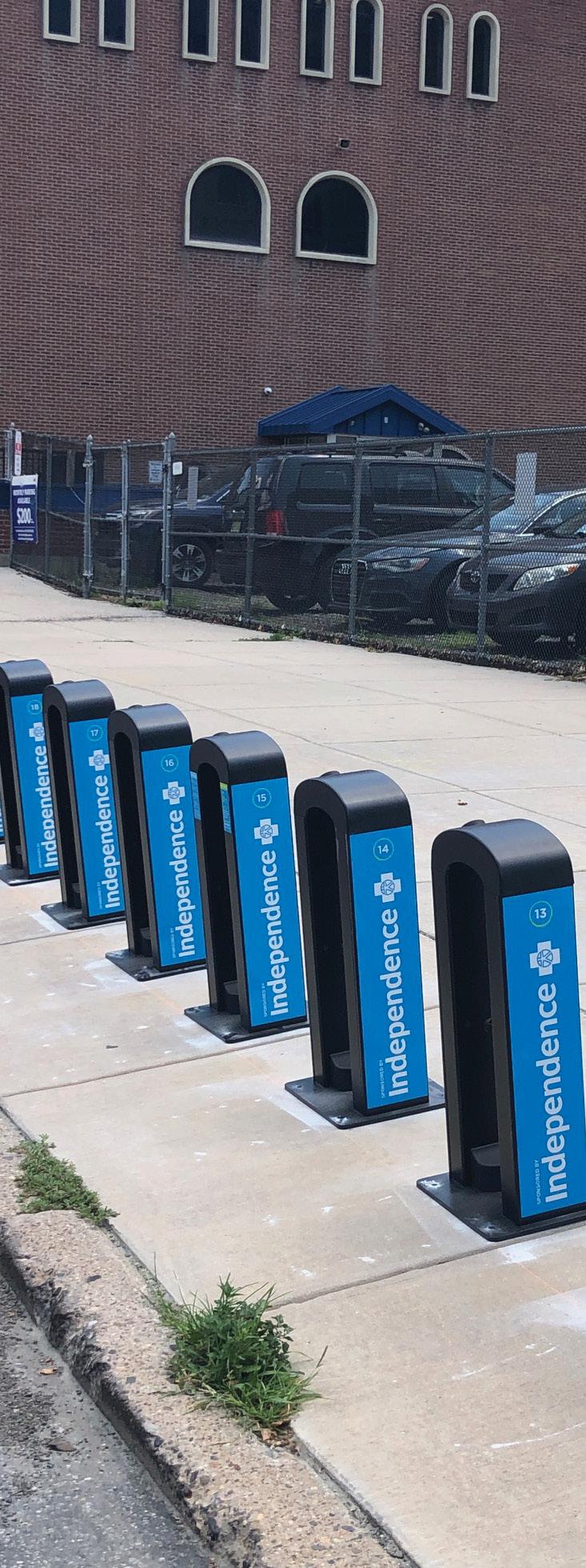
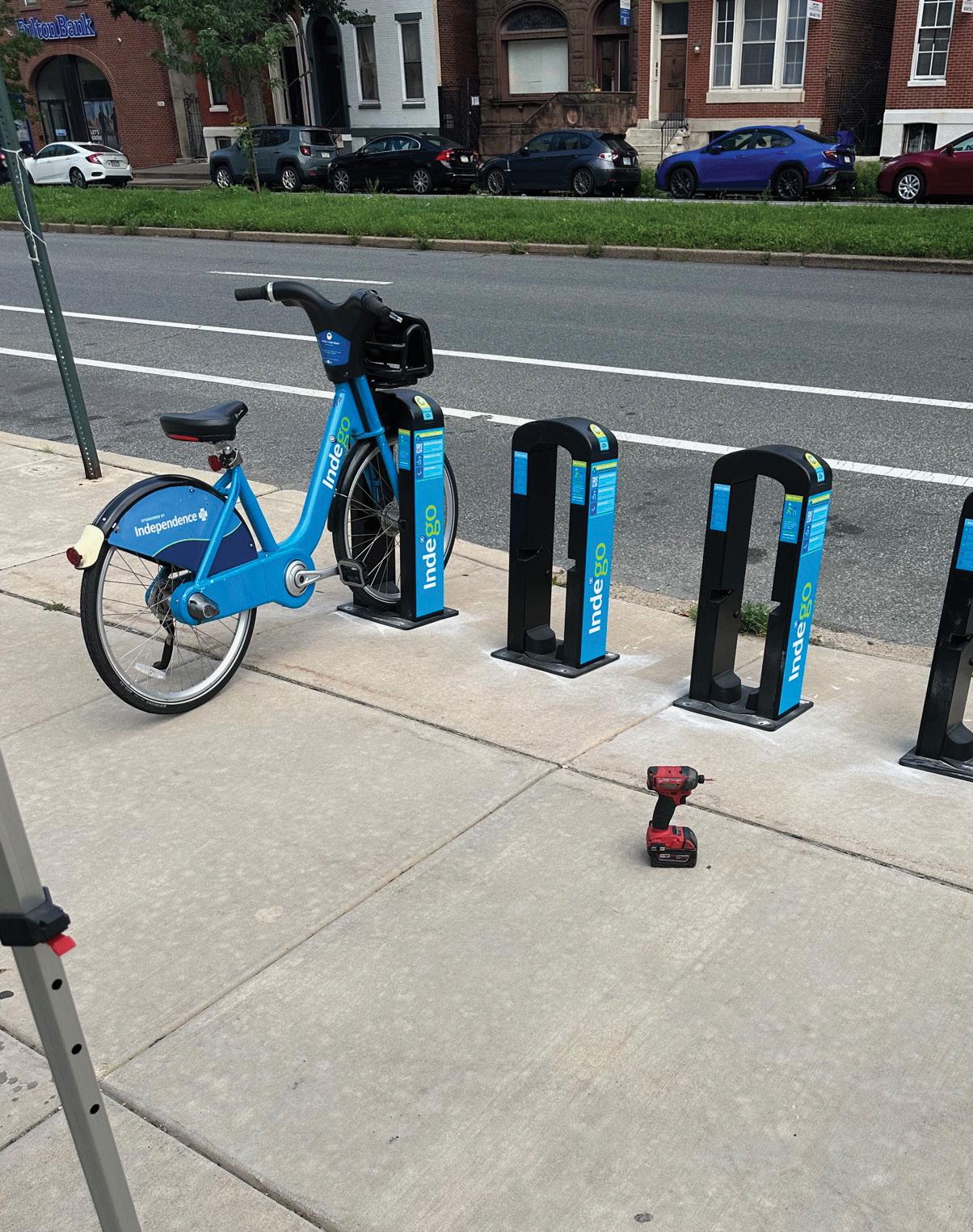
What has surprised you most about your job?
Honestly, before working in the shared micromobility field I assumed that everyone rode bikes all day or that you had to be a super cyclist to be a part of this industry. What I’ve learned is that this is far from the truth. I enjoy biking and bringing that joy to others, but that’s not my entire job. There are several other transferable skills that can make someone a great candidate for my position or any job in this field. I feel this is very important to share because often people avoid applying for positions in the biking and shared micromobility field because they think it’s not for them or don’t see themselves represented in the work. I commend organizations such as NABSA and the Better Bike Share Partnership for the work they do to showcase the diversity of the shared micromobility field so that folks can see them represented and know that this is for them. •
19 FALL 2023 : Philadelphia Medicine philamedsoc.org
FEATURE
G
By William King, MD, PCMS Boardmember
The Philadelphia County Medical Society building sits at 21st and Spring Garden, and at our spring board meeting, we had the pleasure to talk to Stephanie Ridgeway, one of the community directors for Indego, the public bike sharing system in Philadelphia. Ms. Ridgeway was there to help make sure that PCMS had no problems with the installation of an Indego bike share station, recognizable for their royal blue bicycles. Indego, in operation since 2015, has expanded across the city with more than 200 stations and 1000 bicycles, owned by the City of Philadelphia, and sponsored by Independence Blue Cross. PCMS was surprised at the level of attention we were given, but after talking to Ms. Ridgeway, we recognized that Indego is on the same mission as PCMS; we’re both dedicated to getting the City of Philadelphia on the road to health. “We’ve had more than 6 million riders, and our main goal is to provide equitable travel options to people across the city.” Indego is a great resource for Philadelphia, since it has bicycles for visitors to get around town for under $20, but residents can get an Access Pass for as little as $5 a month, or $40 for the entire year. “The affordability of Indego is for everyone, as it gives you a chance to go on www.
ood health is correlated with a healthy lifestyle. Exercise is foundational to a healthy lifestyle. Bicycling is a wonderful form of exercise that for many of us started in our childhood. My first real bicycle was a yellow Huffy Scout 10 speed. A bicycle was transportation, a bicycle was freedom, a way to make money independently., and for us kids, the first tool to get across town and see the world. Without my first bicycle, the road to medical school would have been the same distance, but a much longer mental journey. Once I could get off the block and across town, the world was just a bike ride away.Indego.com and sign up to ride for free, learn to ride a bike, or go on community rides to learn about the green space in the city, and everyone joining the ride gets a swag bag, and a bike helmet, because safety is first. We took Ms. Ridgeway up on her offer, and members of the medical society joined Indego at Bartram’s Garden in Southwest Philadelphia. Dr. Vasudevan, our incoming president, joined Indego on a community ride, and PCMS set up an outreach table teaching southwest youth about heart health with a beef heart. The community came to the event on their own bicycles, or from other parts of the city on Indego bikes. We were very impressed by the demonstration of one of the 400 new electric assist E-bikes, and the discussion of the hundreds of miles of bicycle paths and infrastructure the city has dedicated to safe cycling.
The bicycle racks across from the PCMS building are the visible presence of Indego, but the Philadelphia bike share program is a full service program for our patients looking for access to physical exercise and an even better tool for mental health. Ms. Stephanie let us know “We are blessed to have the bicycle coalition that brings the skill set of educating and teaching people how to ride safely. So if you want your patients to come out, tell them the City of Philadelphia is ready for you. The City of Philadelphia and Indego are bringing quality transportation and the chance to get on their bike, to have some fun, to relive a childhood memory, to change their health situation, but also just have access to a safe, affordable way to get around the city. I don’t have to wish for my old Huffy Scout, I can open my phone, grab my helmet, walk over to one of the hundreds of bike racks, and tour the city in style on a blue Philly Indego bike.” •
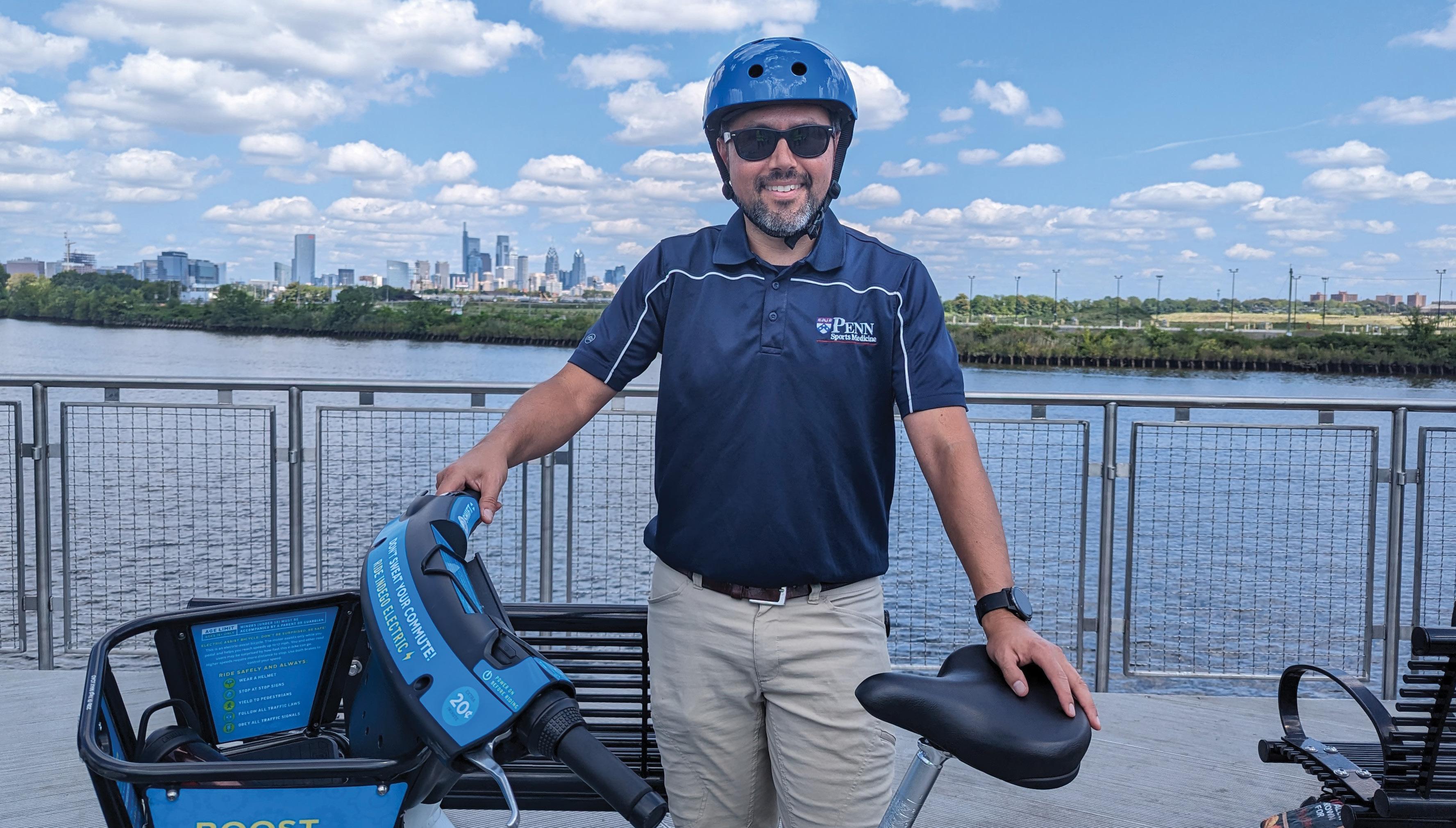
20 Philadelphia Medicine : FALL 2023
Indego Bicycles The Philadelphia road to healthy riding. philamedsoc.org
PMM Union Call for Responses

On May 5th, the University of Pennsylvania’s residents and fellows voted to unionize under the representation of the Committee for Interns and Residents1 (CIR). This represented the largest new union in over 50 years, and set a precedent to be possibly followed by neighboring residency programs in the greater Philadelphia area. For many physicians several years or even decades out of their training, this may come as a surprise, or perhaps no surprise at all in the post-Covid era. We would like to hear from you, our readers, during this interesting time for the future of healthcare in our city. This is an open call to submissions for opinions, general comments, or questions for publication in our next seasonal issue. •
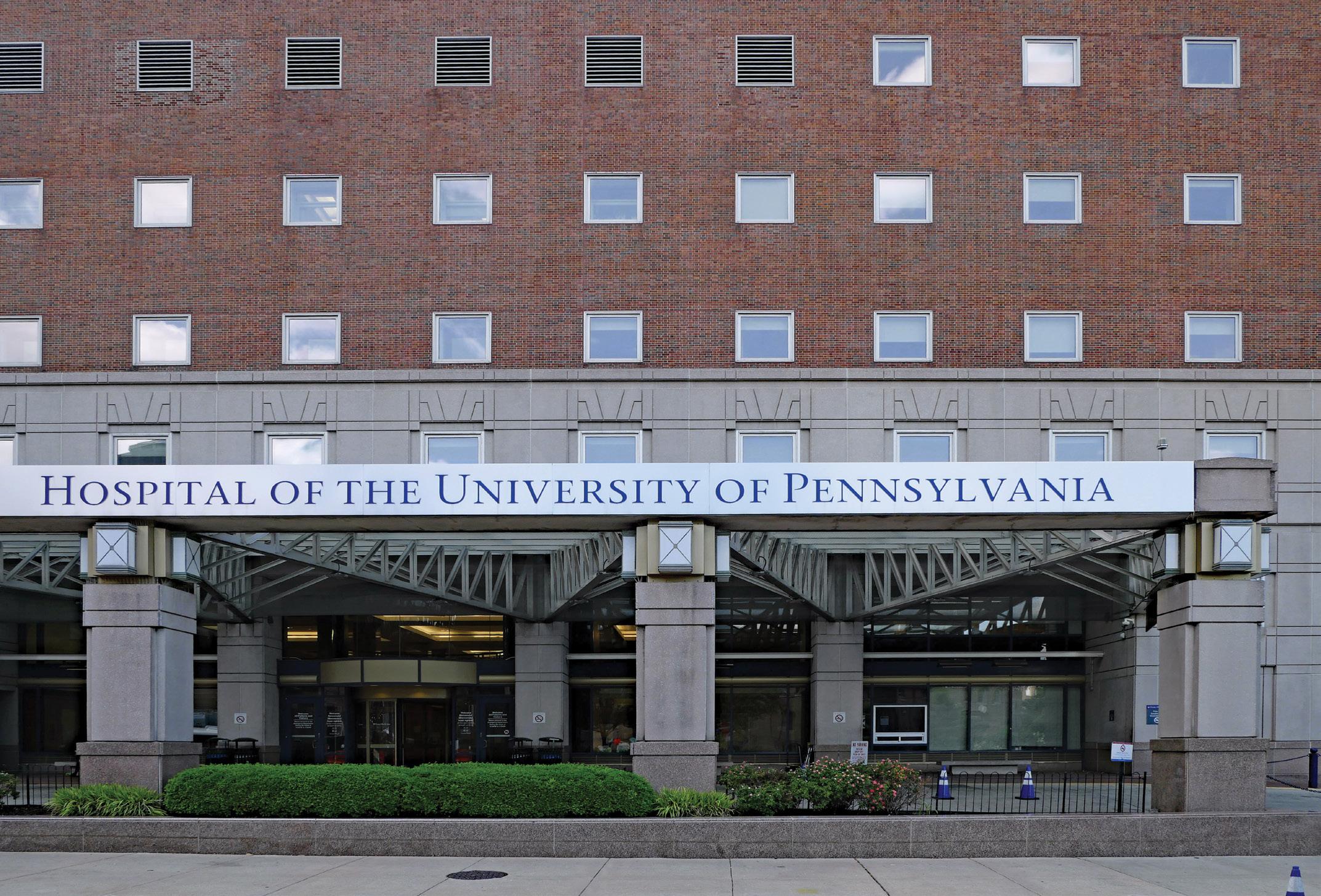
21 FALL 2023 : Philadelphia Medicine philamedsoc.org
1. Ravitch L. Penn Medicine residents voted to unionize, creating the biggest new union in Philadelphia in more than 50 Years. The Philadelphia Inquirer. 2023.
FEATURE
Constituent Voter Patience Tenacity Ask Engage Clinical
BY LARRY L. LIGHT, RETIRED PAMED LOBBYIST

Do you remember the building blocks you probably played with as a child? If that goes back just a little bit too far, then you might recall the building blocks used by your children or grandchildren. Very likely the building blocks were passed down from one generation to the next. It was commonly accepted that playing with those building blocks was an important, if not vital, element of every child’s early age development.

There are building blocks, essential elements of a political relationship between a policy-making politician and a physician, that are just as significant. And, you’re now at an age where you can understand the role that they play. With the state General Assembly and the Congress having started a 2-year legislative session at the beginning of the year, it’s a perfect time to either start building relationships with your legislators or to take some steps to rejuvenate a relationship that already exists. Here are some of the key building block elements to keep in mind.
Constituents and Voters are important to legislators. The pool of constituents in their district in a sense serves as the committee of the whole in determining whether they are doing a good enough job to be elected. Of course, the boundary lines blur with media coverage in the
newspapers, television news and radio reports, but a responsible legislator will be focused on addressing the interests of his or her constituents, the residents of the legislative district or the entire state for a US Senator. There are immense outside influences on every legislator, from special interests to social media activists, who are not constituents and can easily influence issues and policy decisions. When you want to meet or communicate with a legislator to express your opinion, support or oppose a legislative bill or call attention to a problem, being identified as a constituent and registered voter is an important factor.
Patience and Tenacity are two important characteristics for physicians seeking to build a useful relationship with their legislator. It will become quickly apparent that the legislative process does not move with dispatch. Your patients who are upset at long waits in scheduling appointments and procedures would find the long process of committee and floor amendments and votes in both the House and Senate to be even more daunting. Legislation passes into law only when every box has been checked, from introduction and committee approval to signature by the Governor.
Those immersed daily in the legislative process understand that if you oppose a bill, you only must win one of the multiple votes to derail the proposal. The process
Politics & Medicine
22 Philadelphia Medicine : FALL 2023 philamedsoc.org FEATURE
Larry Light is a retired PAMED senior staff responsible for advocacy, governmental relations and political affairs.
is designed to assure that the legislation will have a thorough vetting and to allow each and every member of the legislative body to have input in the final product. The net effect is to provide numerous opportunities to dilute the language through amendments or to win the vote that will bury the bill in committee and effectively kill the legislation. Once a vote is lost, it is almost impossible to recover and reverse the action, so great deliberative care is taken to make certain all of the legislative procedural steps can be completed. Only about 10% of the thousands of bills introduced in a 2-year session are brought up for votes on the Senate and House floor. The process discourages hasty decisions at every turn. It’s not an easy process for physicians to embrace.
Whether you are writing a letter or email to express your support (or opposition) on a legislative issue or meeting personally with the legislator, a guiding principle should always be to Ask for help in addressing the issue rather than telling the legislator what must be done. Having considered the problem at length, physicians and other individuals often fall into the trap of asserting their commitment to a single policy remedy. Legislators soon find that every policy change has multiple implications and
many different invested interests. The key is to focus on addressing the health care problem and working with legislators to achieve a viable resolution to that problem.

If you are seeking to build and maintain a relationship with a legislator, the kind of relationship that will help bring results in the political universe, it will probably help considerably if you find ways to Engage in the political process. Candidates have political campaigns to win elections. The election winners are the ones who decide how the local, state or national government will deal with your issue. Hold a fund raiser to bring together your like-minded professional and personal friends to help the candidate win the election. Take an active part in the campaign by writing a letter to the editor supporting a candidate, or promote the candidate on social media. If the candidate is someone likely to support your position or issue or already has done so, then you’re making an investment as a citizen in the political process. This is how those who are not running for office have input into the political process.
When physicians engage in the political process their Clinical expertise brings a unique skill set to the debate. That also applies to political relationships.
As the relationship develops you can expect to be the go-to contact for the legislator, asked to provide insight on an extremely wide vista of health care issues. Your accessibility to connect and respond will certainly be a positive factor when issues of direct concern to you are on the table. From another perspective, your ability to bring into focus key clinical aspects of a health care issue will make your arguments pro or con even more effective. Your clinical training and experience are widely recognized as credible resources.
These are certainly unusual times in the political universe, particularly at the state and national levels. Political candidates often find themselves fighting more desperately to satisfy their political base than to attack their opponent. Campaigns are often driven by social media generated by sources not directly affiliated with the candidate. The same forces are at play in the legislative process as the primary element framing legislative issues has drifted from solving problems to forcing the other party to make “bad votes.” In that milieu it becomes even more important for physicians to seek opportunities to develop political relationships that will facilitate addressing health care issues that are important to your patients and your practice. •
23 FALL 2023 : Philadelphia Medicine philamedsoc.org
Welcome to America
by Juan Lopez Tiboni, BSc., MB, BCh, BAO PGY-2 Internal Medicine, Pennsylvania Hospital Email: juanlopeztiboni@rcsi.com
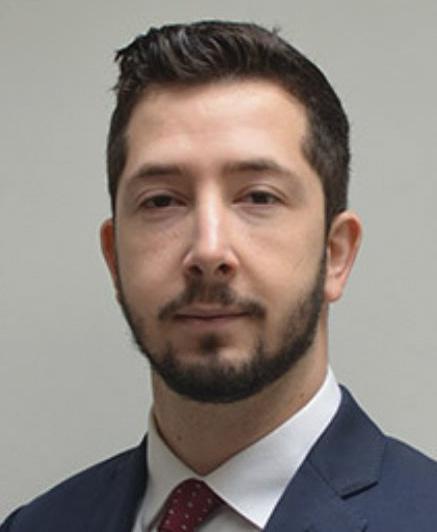
Every year, the United States accepts thousands of foreign trained physicians into residency programs for their medical training. These international medical graduates (IMGs, for short) go on to make up one quarter of the US physician workforce1, and close to half of all hospitalists2
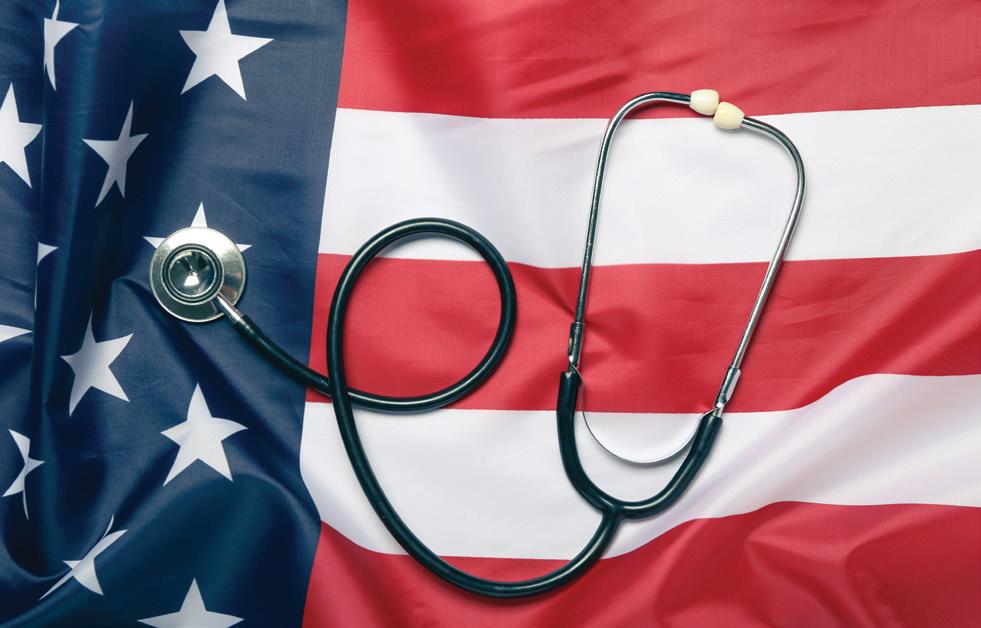
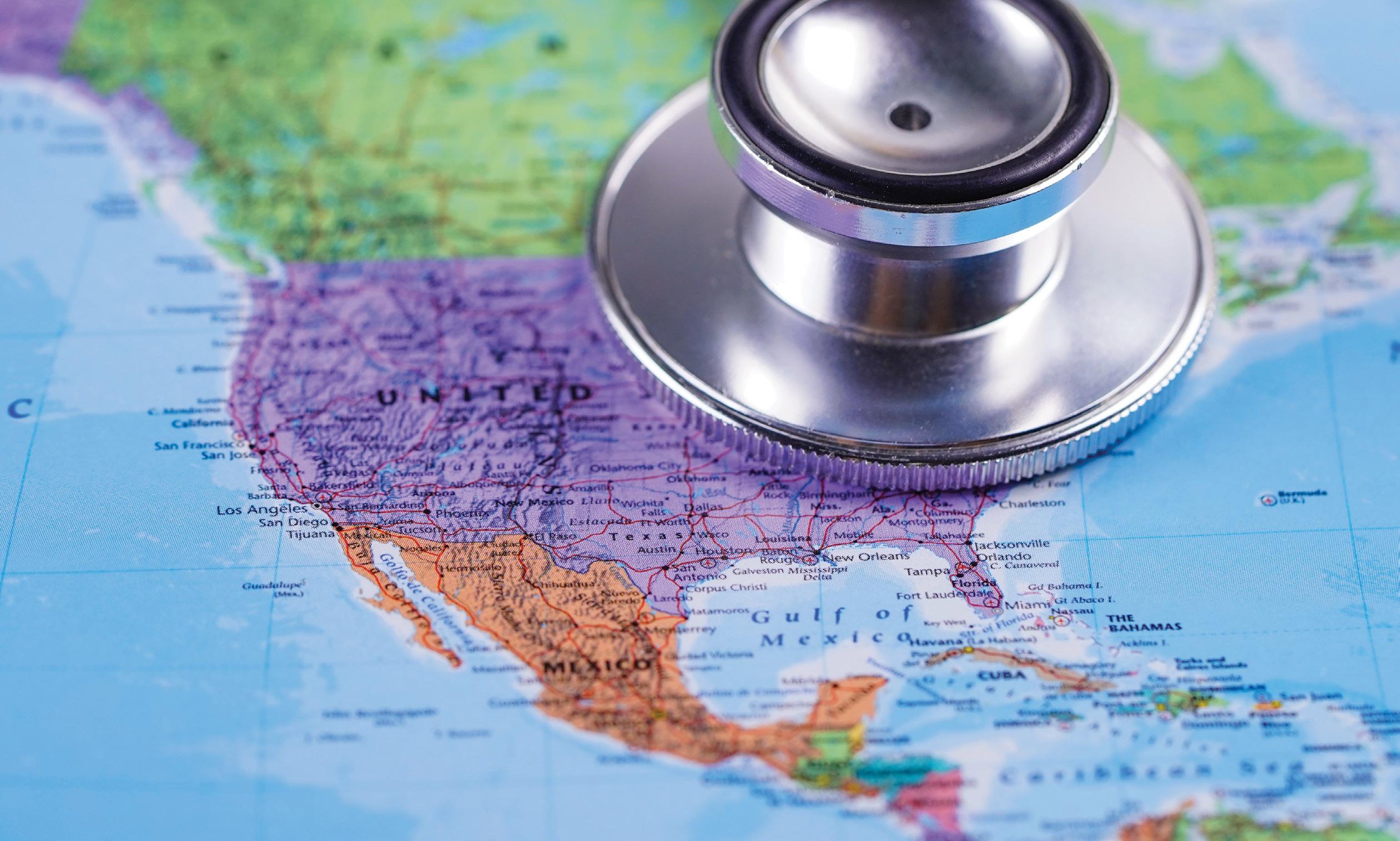
For many, like myself, this transition can be difficult, as we get adjusted not just to a new country, but new technology, new relationships, and a new philosophy of how medicine is practiced. Having moved here just under two years ago after completing my training in Europe, I think back to what it was arriving here in Philadelphia during the thick of the pandemic to start the next chapter on my journey. As a foreign trained doctor it’s not a bad place to be; Jefferson, Temple, Penn, Einstein, even Lankenau not far away and Cooper just across the river; it’s a nearly overwhelming amount of healthcare training in one place.
The system here is obviously quite different than what I came from. I still find it somewhat mind-blowing that within the one city there are so many mega hospitals within what feels like a few blocks of each other, and all part of different networks to
boot. That in combination with the skyscrapers bearing stylized insignias, it just never occurred to me that healthcare groups could ever be so big and corporate-looking.
To say I felt like a fish out of water starting here would be an understatement. Having never rotated through an American hospital during medical school due to the pandemic, there was not just a learning curve, I was in a learning crevice which angled sharply upwards, with a brittle rock-face that crumbled unpredictably, sending you back down to the bottom of the trench right when you felt progress was being made. My difficulties were not with the medicine in any way. I felt competent as a physician from a clinical point of view. My biggest learning curve was the electronic charts and the business of healthcare.
Here, the electronic charts burst uncontrollably at the seams with customizability, data, and way more things than feel appropriate or necessary. Of course electronic charts are the way to go, there is no doubt, but I sometimes wonder if we become victims to them. At times I felt like the guy watching the monitor in The Matrix, with my patients existing more in the
24 Philadelphia Medicine : FALL 2023
philamedsoc.org FEATURE
SAVING LIVES TAKES HEART

computer than they do in their beds. Especially after having trained and practiced in settings where all I did was talk to patients and do physical exams, I felt that I was doing very little of that here. This bothered me.
That’s not why I went into medicine. I went into medicine because I like people, I like doing. In Europe I’d easily get ten thousand steps in a day on the job. Is it crazy to think that a doctor in this city works a 14-hour shift and often less than 60 minutes are actually spent with patients? Believe it. More of our time is spent writing notes, making phone calls, and talking around tables than anyone appreciates.
Thus, everything I’ve learned since I became a doctor has become less about servicing the ‘patient’ as defined by our charts, and more about servicing the person. How to become better at rushing through progress notes while appeasing the chart goblins to avoid getting emails later. Some call it efficiency, others might call it cutting corners. I don’t care what you call it; I will gladly cut the right corners on my notes to spend more time with patients. I’d do it without an ounce of shame, and every now and then you get those moments that make it all worth it.
Those moments when after days or weeks of putting the person first, you get to shake them in the paw on their way out the door and feel their appreciation. Those moments have to be savoured,
cherished, remembered, and imprinted in the mind’s eye, because they are the reason we are here. Meeting someone at their lowest point in life and making that experience fulfilling and meaningful is the greatest gift of our profession. That power of connection transcends any medicine or lab test, reaching so much farther than we can understand, and it’s only when you find those moments that you remember why it’s such a privilege to do this job. Why it’s such a privilege to really care.
So to all the would-be interns in this city, foreign or domestic, I hope my reflections serve you the following advice: remain true to yourself and the reason you went into this job. Don’t buy into the frothing hysteria and obsession with box ticking. Cut the right corners, stay out of trouble, and be there to actually connect with your patients. We get the chance to step into people’s lives during their darkest times, filled with anxiety, fear, and death. Relish the opportunity to see the patient behind the screen; don’t trade that human connection for a keyboard. First of all, be a doctor, and last of all…
Welcome to America •
References
1 AAMC. Physician Specialty Data Report. 2022.
2 Jones K, Whatley M. Hospitalists: a growing part of the primary care workforce. AAMC Analysis in Brief. 2016;16(5).

25 FALL 2023 : Philadelphia Medicine
Annual College of Physicians Story Slams
The 5th Annual College of Physicians Story Slams was held in May at the College of Physicians of Philadelphia and co-sponsored by the Section on Medicine and the Arts and by the Delaware Valley Medical Student Wellness Collaborative. Douglas Reifler, MD, Professor of Medicine at Cooper Medical School of Rowan University and Chair of the Section on Medicine and the Arts at the College of Physicians of Philadelphia, helps facilitate these annual story slams. The story slam events at the College of Physician of Philadelphia are open to the public, and the metropolitan Philadelphia Medical Schools are invited to field a team of two storytellers. Each of the seven (7) medical schools is invited to send a team of 2 storytellers, at least one of whom must be a medical student. The other can be a health professional at any stage of training or practice. Each contestant has 5 minutes to tell a medically-related story and at the end, the audience will select the three best stories.
Remember, participants need to think carefully about the story they want to share that conveys the fascinating, aweinspiring, exciting, fulfilling nature of doctoring; at the same time avoid profanity, refrain from slander, and be respectful of patients, colleagues and others mentioned in their story.
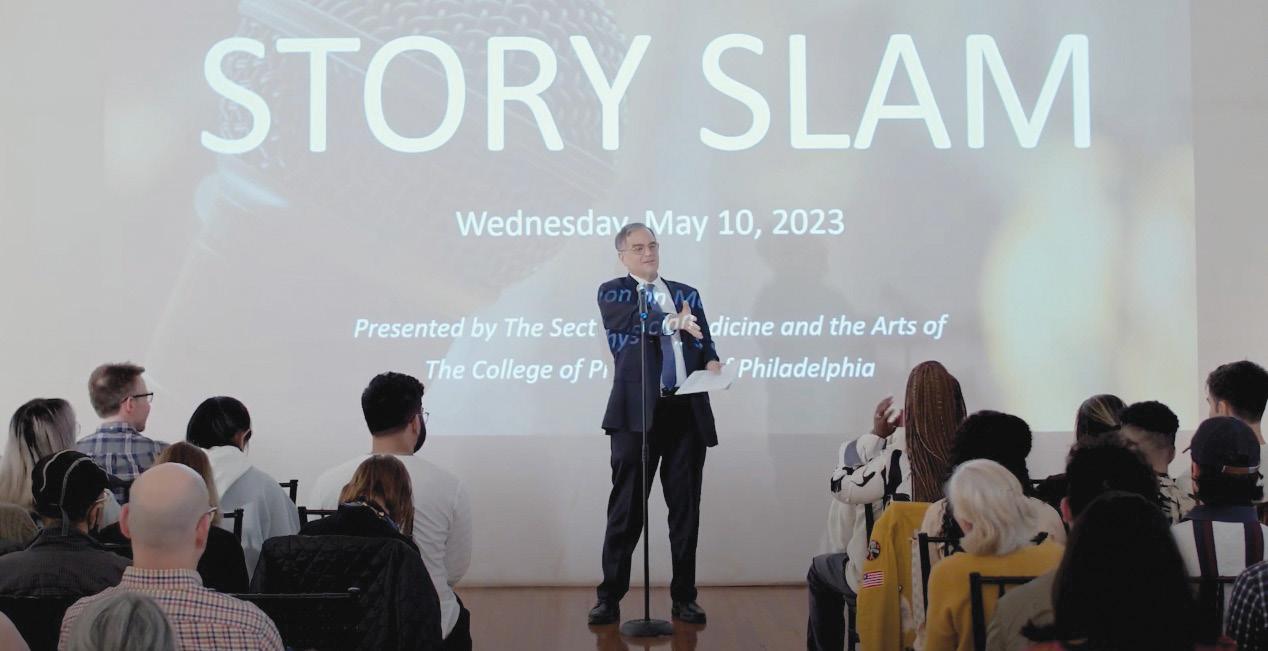

Tasteful humor is always welcome but the event’s purpose is to share inspiring, thought-provoking stories. It is a festive event that attracts an appreciative audience. And the stories are followed by an audience vote for their favorite stories, recognition, and a wine and hors d’oeuvres reception, where the audience and storytellers interact and celebrate.
Congratulation to the 2023 College of Physicians Story Slams Winners
1st Place
Zahraa K. Mohammed, PCOM, 1st Year MS, Story titled “Are You Listening?”
2nd Place
Katya Ahr, MD, Internal Medicine Resident at Temple, Story titled “Sarah’s Skittles”
3rd Place
Milan Arya, Cooper, 2nd Year MS, Story titled “Now Do You Believe?” •
26 Philadelphia Medicine : FALL 2023
philamedsoc.org FEATURE

PCMS STUDENT INTERVIEW:


Heta Patel
Perelman School of Medicine at the University of Pennsylvania 3rd Year Medical Student
As a Penn MSS leader, PCMS PAMED MSS Leader, Delegate to the PAMED House of Delegates, and Member of numerous organizations, tell us about all the medical activities you are involved with:
3rd Year Medical Student
Currently, I serve as the Penn Med delegate to the American Medical Association, Vice Chair of the Medical Student Section of the Pennsylvania Medical Society (PAMED), and member of the Philadelphia County Medical Society (PCMS). I am also one of the Course Representatives of my medical school class which entails working with faculty and students to improve our curriculum.
Research wise, I have been involved in a vascular neurology project refining imaging thresholds for stroke management. I have also been on multiple studies centered on improving quality and equity of care in the ICU space. Healthcare access is incredibly important to me and is a value that has translated into my varied community engagement involvements.
I have been a part of United Community Clinic, a Penn Med free clinic serving the West Philadelphia community, and Covenant House, a clinic for homeless and trafficked youth, since undergrad. As a global health major and Hispanic Studies minor, I also have a passion for serving Spanish-speaking communities both in the US and abroad. Here in Philadelphia, I have been able to volunteer with Puentes de Salud, a clinic for our city’s uninsured Latino population, and internationally, I have worked in Peru and Guatemala.
I additionally have an avid interest in the medical humanities and have served as Co-Editor-in-Chief of Penn Med’s literary magazine apenndx. I am also a part of the Penn Medicine Listening Lab which is a narrative medicine initiative sharing the stories of patients, caregivers, and clinicians. Two years ago, a few peers and I co-founded the Last Writers program, pairing medical student volunteers with Penn Med hospice patients and family members to write and publish personal memoirs.
28 Philadelphia Medicine : FALL 2023 philamedsoc.org FEATURE
Heta Patel
Perelman School of Medicine at the University of Pennsylvania
Tell us a little about your road to Medicine. Why did you choose Penn and what drew you to Philadelphia ?
Ever since an early age, I have had an interest in biology. I remember being gifted a book about the human body for my tenth birthday and being quite enthralled! However, it was not until I started volunteering at my local Veterans’ Hospital in 9th grade when I realized that medicine was more than scientific facts but also a deeply human exercise of healing, a realization that I have carried with me since.
When it came time to pick my college of choice, I knew I wanted to go somewhere with incredible diversity and with a strong medical system. Penn was an easy choice – a marriage of incredible faculty and scientific achievement with a strong emphasis on community initiatives and organizations. It was also located in a city that was quite familiar. In fact, I was born right outside of Philadelphia but moved to Florida when I was 6. Coming to Philly felt like returning home.
Throughout my undergraduate years, I was involved in various community clinics, research projects, and even my campus’s EMT agency. My work with faculty in the US and Latin America demonstrated to me the incredible diversity of the medical profession from policy work to research to community building. I knew that serving as a physician would offer me the ability to personally impact the health of the patients I encountered but also make system-wide changes. It was the diversity of the profession as well as the lifelong journey of learning that solidified the decision of medical school for me.
What do you like most about medical school?
Medical school has been a time of incredible growth, challenge, and joy. For the first time, my peers and I are learning facts and accruing skills relevant to our vocations. Whether it is the marvel of cadaver dissections, placing our first IV, scrubbing in on emergency laparotomies or witnessing the death of our first patient, every day is a reminder of what an honor it is to be tasked with learning about ailing bodies and how to care for them. Being surrounded by incredible peers, all driven to make a difference in their respective fields, has been inspiring. I have undoubtedly learned so much more over the past two years than I ever have and look forward to absorbing even more during the rest of my clerkship year and beyond.
How has Organized Medicine impacted your career in medicine? What do you value the most regarding your membership in PCMS PAMED?
Serving as a member of AMA, PAMED, and PCMS has enabled me to dive deep into the health policy arena. Through my involvement, I have been able to attend the annual AMA and PAMED HOD conferences as a voting delegate which has kept me abreast of pressing policy issues. Being immersed in key discussions between physicians and students from all over the country has broadened my understanding of the American medical landscape.
It has also been inspiring to witness the spirit of change and progress held by fellow members of PCMS and PAMED. Through organizing debates and writing resolutions, my participation in the Medical Student Section has reaffirmed my interest in policy and systems-level initiatives. Most of all, meeting incredible physicians and students dedicated to making a difference has provided crucial connections and expanded my network beyond my medical school and health system.
What would you tell someone who is interested in going into medicine?
I would remind them that medicine, although incredibly rewarding, is quite difficult. It requires diligence, sacrifice and patience – all skills that take time to develop and nurture. Despite all the long nights studying and challenging clerkship encounters, every day I go to sleep a little bit wiser and more resilient. It’s an honor to be able to grow so profoundly in such a short period of time.
I would also remind students that life goes on during medical school and that it’s incredibly important to balance personal relationships, hobbies, and interests alongside your medical education. Burnout is a real phenomenon and remembering the little things can be incredibly selfsustaining. •
\ 29 FALL 2023 : Philadelphia Medicine philamedsoc.org
PCMS’s first annual outing to the Phillies game was a huge success! Thank you to everyone who attended! Pictured below are some of the PCMS Board of Directors. Despite all those physician cheers, our Phillies lost a close game 5-4 to the Marlins. •



30 Philadelphia Medicine : FALL 2023 FEATURE philamedsoc.org

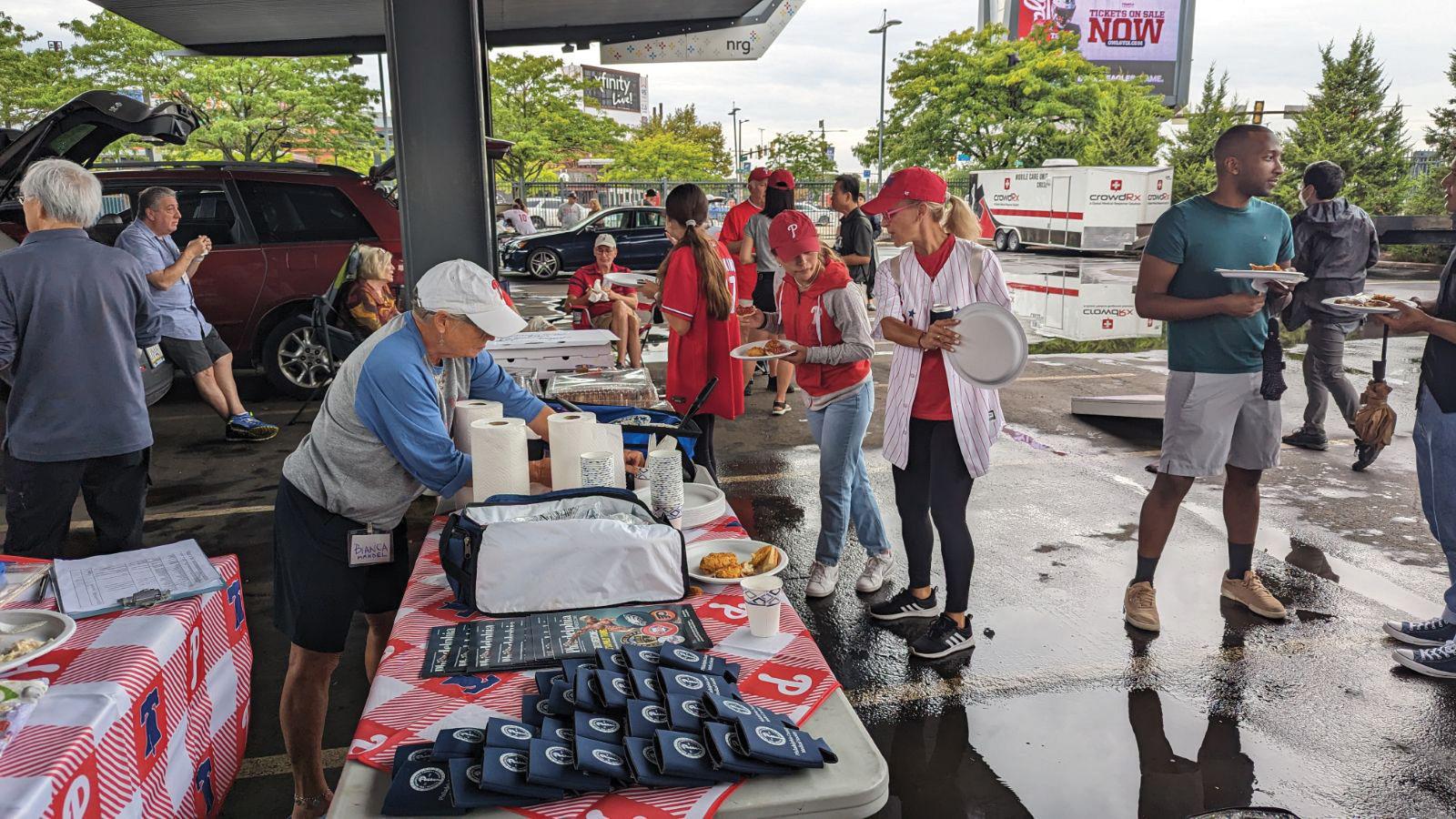
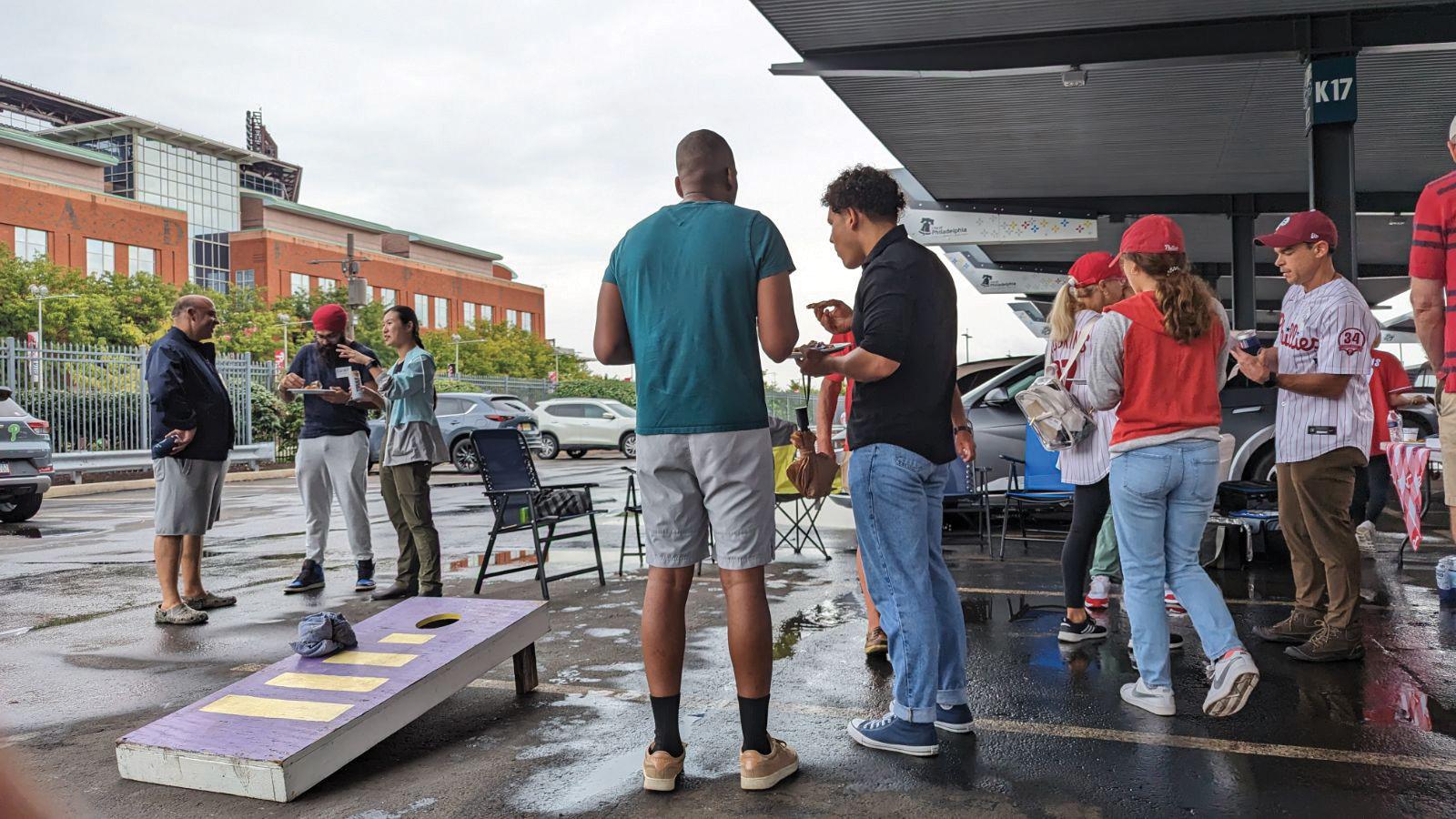
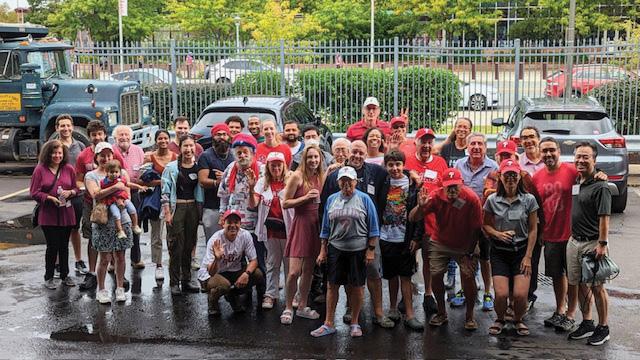
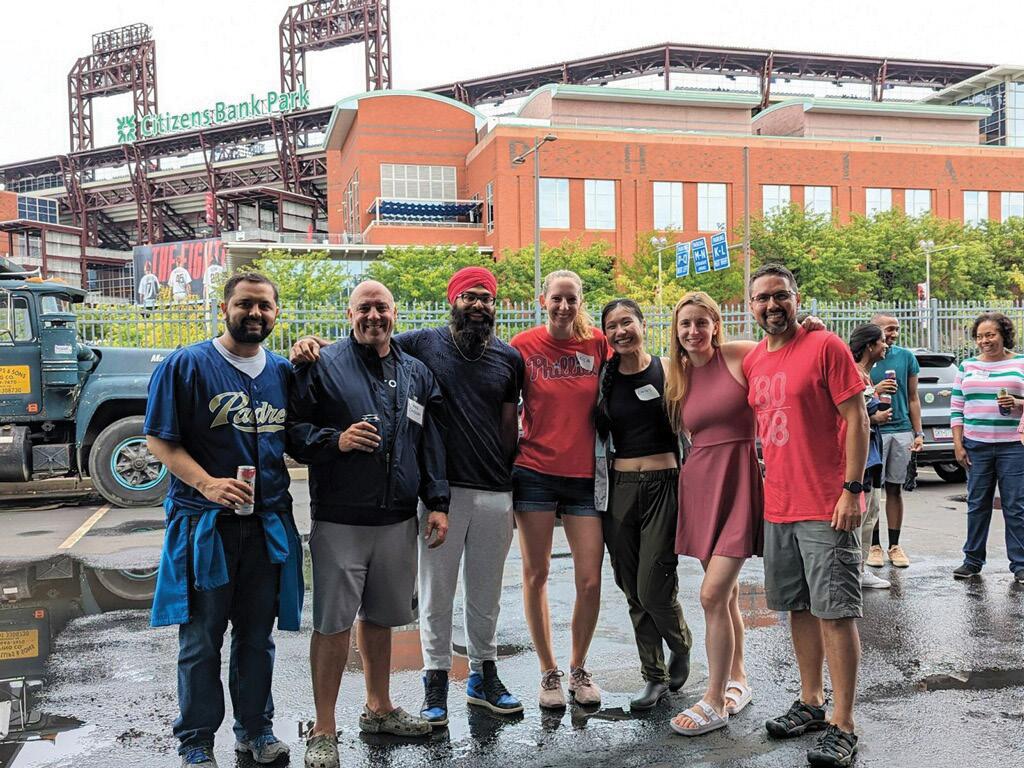

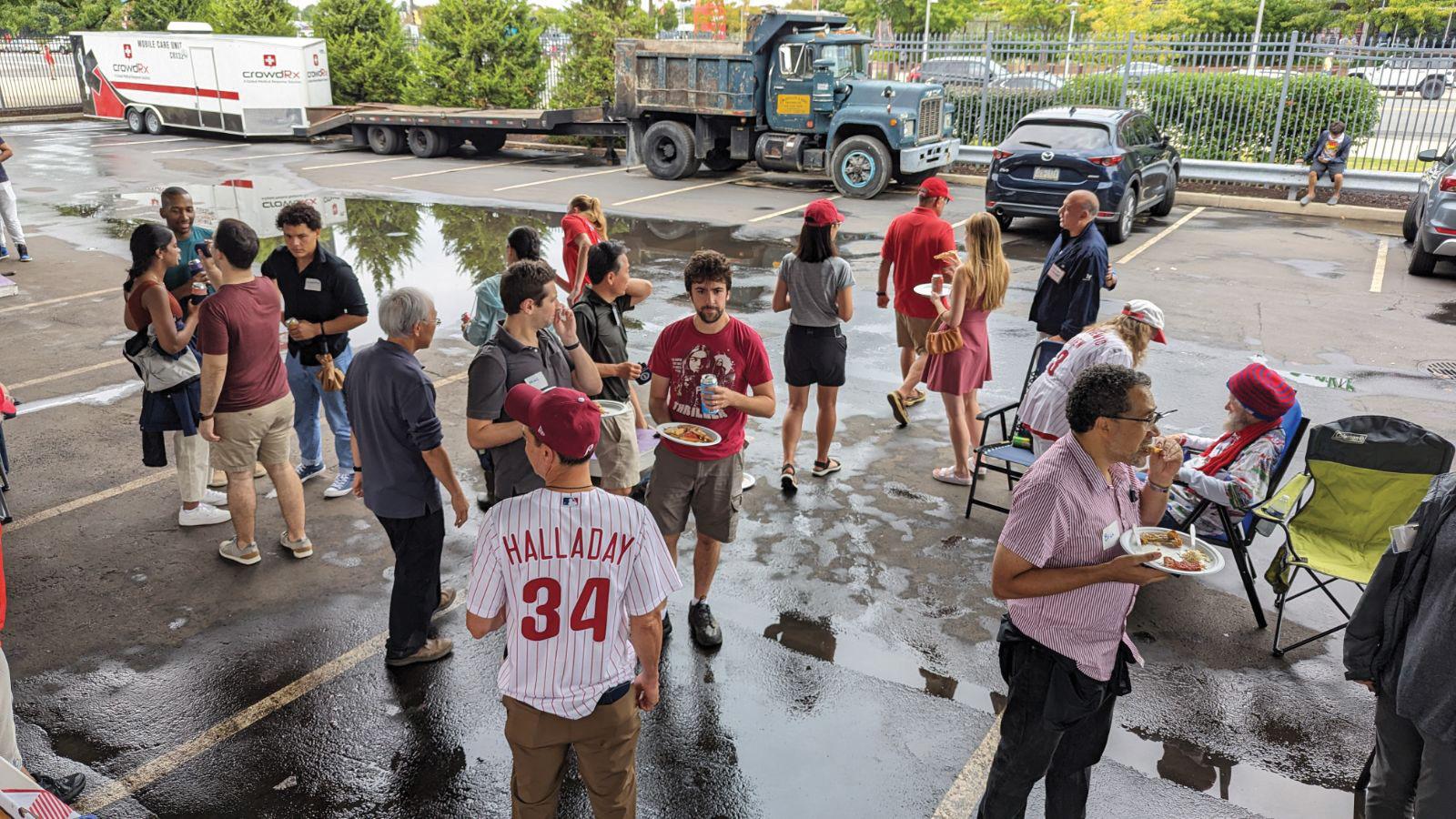
philamedsoc.org 31 FALL 2023 : Philadelphia Medicine
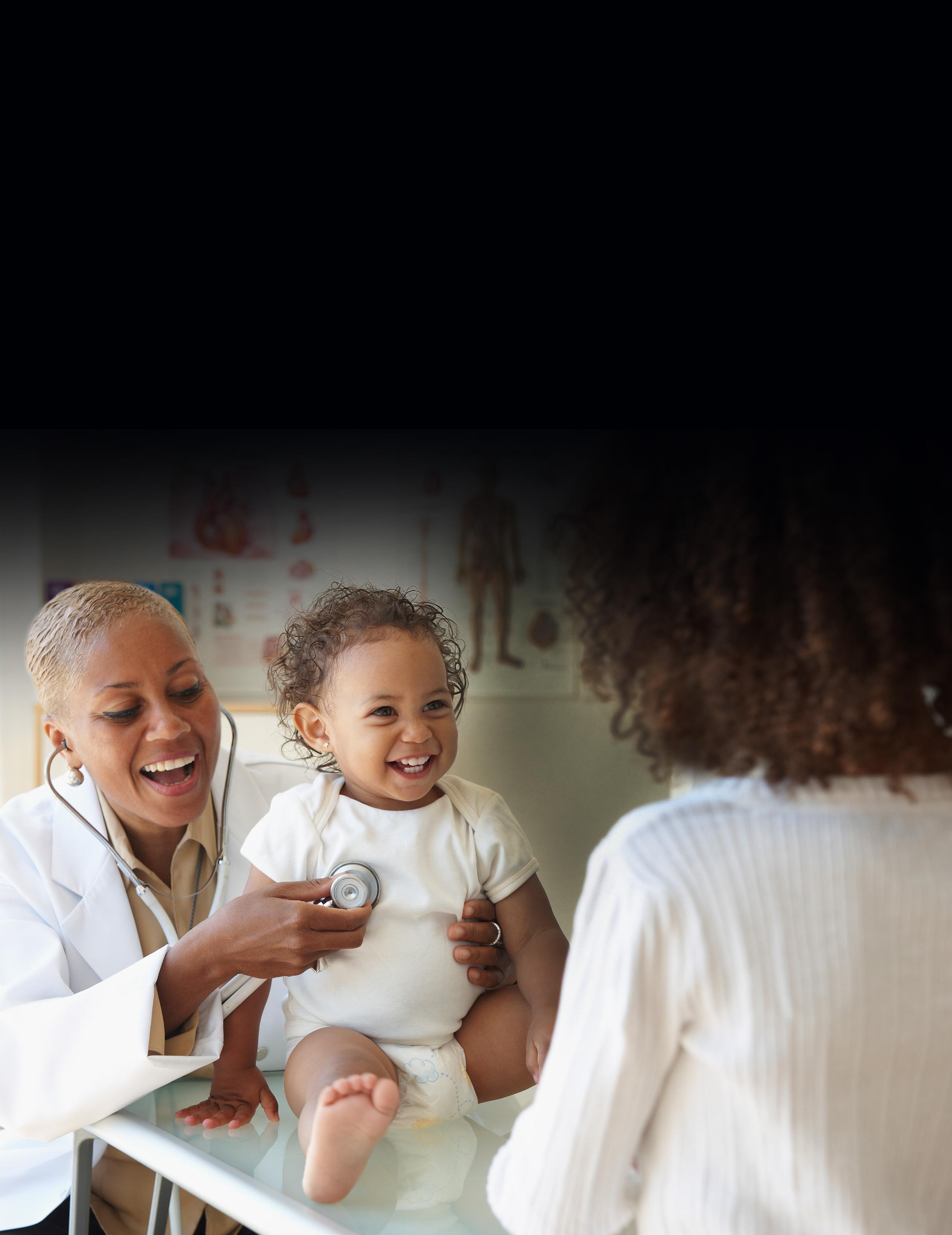
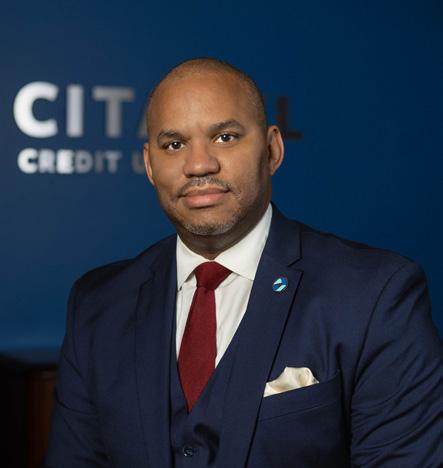

Meet Our Healthcare Banking Expert Andre Jones, Senior Relationship Manager Healthcare Banking 484.947.6309 | CitadelBanking.com/Healthcare WELCOME TO BETTER Built for Your Practice BUSINESS BANKING We understand that starting, running, and expanding a practice is no small feat. Our team of Relationship Managers offers years of experience partnering with healthcare professionals to develop custom strategies that address your distinct needs and challenges. Citadel is recognized as a Forbes 2022 Best-in-State Credit Union. Federally Insured by NCUA


















































































